|
restoring our biblical and constitutional foundations
|
| welcome |
October 2014 Blog Archives
Friday, October 31
9:02 AM I've been looking over the previous volumes in our Areopagus series with Energion, taking a moment of pure gratitude to see how God has been developing it through the years. It makes sense to be grateful when faced with all this. Today I have the joy of editing our next volume by Chris Freet.
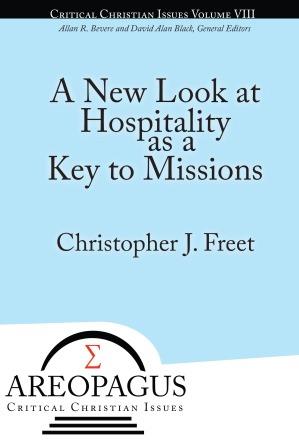
The publisher writes:
Chris Freet examines the biblical idea of hospitality, the role it played in biblical times, and the example that provides for us. He concludes that the western church needs to be re-awakened to the mutual and reciprocal biblical definition of hospitality; that it must undergo some contextualization in order for the biblical role of hospitality and the “person of peace” to work in it; and (3) it must transition from short-term encounters of hospitality in the West to long-term relationships as the family of God.
Do you practice hospitality? Chris Freet makes a strong case for the primacy of hospitality as a primary Christian virtue. Elders are required to be hospitable (1 Tim. 3:2; Tit. 1:8), and every single follower of Jesus is to share that same responsibility (Heb. 13:2). I especially love Lev. 25:35: "If your brother becomes poor and cannot maintain himself with you, you shall support him as though he were a stranger and a sojourner, and he shall live with you." That's why we have restored the old farm house on our property. It is available for those who need temporary housing and is provided free of charge. (For pix, go here).
Freet's book doesn't give you pat answers but it will give you a framework for asking the right questions about how well you are using "your" home for the sake of the kingdom. I am eager to see it in print.
8:32 AM Happy Reformation Day! When Luther reformed the content of the Gospel, he left the outer forms of the church essentially untouched. I believe it's time for new wineskins, for a reformation of structure. This is as much a theological issue as was the return to justification by faith during the Reformation. Only now the issue is not soteriological but ecclesiological.
As God changes the church, one area He is developing is the concept of Body Life – the notion of believers ministering to other believers in the power and love of the Holy Spirit. The New Testament church was a mass of small groups (house churches) where elders were no more than a part of the whole and where the whole spiritual organism flourished by the individual "ministers" (the believers themselves) finding their proper role and place in the church. The key was mutual sharing, fellowship, and participation – believers functioning as "priests" instead of the heavy professionalism we find today. They realized that God entrusted His Body not into the hands of an administrative bureaucracy but into the hands of believers who took the "one anothers" of Scripture seriously. Too much of modern Christianity has fled from the doctrine of the priesthood of all believers. There is very little "one-anothering" taking place in many of our congregations. Just as we have cars full of single people, so the church is marked by organized artificial performances in which the majority of believers are mere passive observers.
A reader once sent me a link to a wonderful video entitled Lessons of the Geese. From the window of my home office I have often watched these beautiful birds over-flying our farm and marveled at the beauty and symmetry of their formations. So when I first saw the video, its spiritual applications immediately struck me, for it is a wonderful metaphor of the church and the priesthood of believers. I hope you enjoy it.
P.S. When a goose gets sick or wounded and falls behind, other geese fall out of line and stand by him until he is ready to rejoin the flock. I could never have faced the trauma of Becky's death alone. So thank you. Thank you for falling behind me and lifting me up. Thank you for storming the gates of heaven on my behalf and on behalf of my family. Thank you for sharing this adventure with us. Thank you. God hasn't healed me completely yet, so please keep praying.
Thursday, October 30
5:52 PM The dogs just took me for a long walk.
They insisted that I feed the donks. Who am I to argue with dogs?
Here's the old farm house in all her beauty.
Are you enjoying the fall season as much as I am?
4:26 PM See this little device on the horse's halter? It can tell you whether or not your horse is sick or injured.

I believe I will get one for myself. That way my family will know if I have colic or laminitis.
12:20 PM Check out this bird eye's view (literally) of Paris. Unbelievable.
12:12 PM One can now study Jewish theology in a major German university. This looks like a very interesting development.
10:14 AM Need a good laugh today? The comments will have you in stitches!
9:18 AM As you know, I'm asking all of my doctoral students to try and learn Latin as part of their studies under my tutelage. I can't require it but I can strongly encourage it. I can't see how anyone can be considered educated without a reading knowledge of that language. Here's a simple passage you might enjoy translating this morning (since you have nothing better to do with your time -- haha!):
Haec puella est Cornelia. Cornelia non est alta. Cornelia non est magna. Cornelia est puella parva. Haec puella est puella pulchra et bona quoque. Cornelia non est puer; est puella parva. Cornelia non est magistra. Cornelia est discipula. Haec puella non est discipulus; est discipula. Haec est magistra. Haec non est magister. Haec est femina et magistra. Haec non est discipula, non est discipulus. Haec est magistra. Cornelia est discipula. "Salve, magistra." "Salve, Cornelia. Cornelia est puella bona." "Magistra quoque est bona. Vale, magistra." "Vale, Cornelia."
Go here to read the rest of this delightful story.
8:45 AM It was late last night and I was reading in bed when I suddenly felt overwhelmed, felt something rising deep within me and clawing its way to the surface, loud and painful. Once again God was challenging me, offering me another opportunity to trust Him viscerally. My mind went to the passage in Philippians we had studied this week in my Greek 3 class, the passage about a man named Epaphroditus. He had ministered to Paul in prison, had gotten desperately ill, but God had healed him miraculously, thus sparing Paul "sorrow upon sorrow." All I can tell you is that, had Epaphroditus died, Paul would have been overwhelmed with grief, wave after wave of sorrow assaulting him mercilessly.
Well, God in His love and sovereignty allowed Becky to become desperately ill. For four and a half years we battled cancer together. But unlike Epaphroditus, her illness was unto death. It's common for a major loss in life to trigger the memory of previous losses, and if those losses weren't grieved over, the pain begins to pile up, it accumulates and is added to your current pain. The result is often emotional trauma. Paul's honesty in Philippians is refreshing. "God had mercy on him, and not only on him, but also on me, to spare me sorrow upon sorrow." This verse is the counterpoint to all the verses in Philippians that speak about joy. To rejoice in the Lord does not mean that you deny the reality of your loss. When a person loses someone precious to them, you needn't admonish them, "Don't be sorrowful. Death is nothing but the entrance into eternal life, into the very presence of Jesus. We are to be content even when someone precious to us dies." At some point during the process of recovery, you will hear those words from well-meaning friends. What they fail to realize is that when someone close to you dies, part of you also dies. You grieve not only for them but also for yourself. You are forever "without" that other person. You feel frustrated, hurt, helpless, and afraid. Sometimes you may even become angry or depressed. Neither emotion represents a lack of faith. They are simply responses to loss. Grief is that 30-feet wave I surfed at the Banzai Pipeline when I was a teenager. It moved over me and broke against me and there was nothing in the world I could do about it except yield to its force and let it carry me to a new place until it ran out of energy.
Last night, as I sat in my bed, overcome with emotion, I asked myself, What caused this sudden sorrow? What triggered it? And then it became clear to me. I had been checking the national weather map on my iPad, moving from the East Coast to the West Coast, and as I moved into the deserts of Arizona my mind blew a gasket. Before me, staring at me unforgivably on the map, were the places Becky and I had vacationed with our family while we were living in California. Memories began to race through my mind -- Bryce, Zion, the Grand Canyon, Meteor Crater, Winslow, Canyon de Chelly. I suddenly felt empty, depressed, sad, withdrawn. I felt like Lee at Chancellorsville: outmanned, outgunned, outsupplied. For a brief moment I forgot that I was not alone, that Jesus Himself, the Man of Sorrows, the one who was "acquainted with grief," was sitting right next to me, holding my hand, understanding my loss, weeping and mourning with me like He did at the tomb of Lazarus, not trying to rush me through the sadness but letting it accomplish its perfect work, teaching me how to embrace my grief, and the steps to recovery. Raw and fragile, I receded into self pity.
And then it happened. I heard the ring on my iPad telling me an email had just arrived. This is what I read:
Dear Dave,
Just wanted you to know that I am especially praying for you this week. I have followed your blogs about Becky now for a year and have appreciated them so much. I don’t pretend to understand your journey but I have been going on one of my own since my dad died a year ago Oct 31. I know it doesn’t come close to the pain of losing a spouse but he was still my dad for 58 years and I have terribly missed his voice and words of encouragement. Your willingness to openly blog your pain and your healing process has helped me through mine this past year and I am truly grateful to God and to you for that. May the Lord comfort and encourage you through His Holy Spirit’s ministry over the coming days.
Love in Him,
Your brother in Christ.
The sky suddenly lightened. The wind subsided. The dust settled. The wave released me. God, who had seemed so distance, now felt so close that I thought I could touch Him. Tell me it isn't so, I said to myself. How did this friend of mine, who lives 7,000 miles away on another continent, know that he needed to send me that email at that precise moment in time? This is not normal. It is inexplicable -- unless you believe in a God who sees your vulnerability, sees that something has been ripped away from you, and yet still loves and cares for you. It's as if He was saying to me, "Dave, your grief is okay. It is a statement that you loved someone very much."
And what of this morning? The disruption, the confusion, the sorrow is still with me to a degree. I learned long ago that I can't just hang up my pain like I hang up my shirt in my closet at the end of a work day. Grief is my constant companion, though sometimes it is more blatant, more in-your-face than at other times. Often, when I least expect it, the grief returns, sometimes like the crashing wave at Pipeline, sometimes like the oozing lava that is bearing down upon Pahoa on the Big Island today. I know that some of you feel the way I do about Becky's loss. You share with me my pain, my grief. I have spoken with many of you. You have your own pain, too, some of you do. You lost a child or a parent this past year. There was a miscarriage or a stillbirth. That infant, though dead, still fills the bleachers of your mind. Loss is not natural, normal, predictable. I want you to know that I grieve for you too. Enter fully into your sorrow. Weep like I did last night. Go ahead and feel the pain of your loneliness (even though you are never really alone). Something absolutely life-changing has occurred in your life. Face it head-on, learn from it, let it do its work. Expect your feelings to intensify in the months ahead. And when deep within you those memories trigger the sights, sounds, and even smells of the past, when your pain overrides your ability to pray even, when all you can do is sit there and mutter over and over again, as I did last night, "Dear God, Lord Jesus," remember that Christianity embraces both real tears and real hope. Max Lucado put it well (No Wonder They Call Him the Savior, 105-106):
Tears.
Those tiny drops of humanity. Those round, wet balls of fluid that dribble from our eyes, creep down our cheeks, and splash on the floor of our hearts. They were there that day. They are always present at such times. They should be; that's their job. They are miniature messengers; on call twenty-four hours a day to substitute for crippled words. They drip, drop and pour from the corner of our souls, carrying with them the deepest emotions we possess. They tumble down our faces with announcements that range from the most blissful to the darkest despair.
The principle is simple; when words are most empty, tears are most apt.
Love,
Dave
Wednesday, October 29
6:22 PM Hola, amigos! It was another beautiful week on campus.
The faculty had a Ph.D. meeting with the head of our doctoral program, Heath Thomas. Lots of good things happening, not least is that beginning in 2015 we will have a concentration in New Testament for the first time. Awesome.
Then it was lunch with "Mr. Evangelism" himself, Alvin Reid. The man's definitely eccentric but, hey, I guess it takes one to know one.
Here's a crazy thought to leave you with. In general, the church in America has done a pretty lousy job of manifesting kingdom love in radical ways, but just think what would happen if, instead of withdrawing from the public sector, we mobilized doctors and nurses by the thousands to leave for the Ebola-stricken regions of West Africa. This is what the Gospel is all about, right? Manifesting Jesus' Calvary love to the world in ways that make them sit up and ask us, Why do you love us so much? As I argue in my book The Jesus Paradigm, the best way we Christians can transform society is by imitating Jesus and humbly serving the world in every way possible. We have 16.2 million Southern Baptists. Can't you just see CNN reporting that a thousand SBCers were deployed to Africa in the name of Jesus? How beautiful it would be if instead of vying for political power we would follow the simple example of Jesus.
Time to get some writing done. I'll be blogging a lot about Becky this week (hope you don't mind too much). The more I think about her, the more grateful I become. Being alone is an opportunity to listen to what God is saying to you, to get your bearings again, and to see things about yourself that you might not have seen otherwise. So stay tuned!
7:46 AM Looking forward to team teaching the LXX class in the spring with OT prof Chip Hardy. Three cheers for teamwork!

7:40 AM Doctoral students, please take note. Over at Theological German Herr Mark has added a very useful link called the Bonhoeffer Index. Perhaps my favorite link is the last one, On the German Language, in which Bonhoeffer admits that German can give even a native speaker a painful charley horse between the ears. I will admit, though, that I found it very delightful to discuss theology in German. I had a little cache of friends in Basel who were very Barthian in their view of the Word of God, and they thought I was off my theological rocker for holding to the doctrine of the verbal-plenary inspiration of Scripture. High comedy at times, let me assure you. I think the whole matter of misunderstanding between American and European theologians shows a petty state of imbecility. It's not pleasant to think of the sheer folly of grown men talking past each other when they could be enjoying a good Jägerschnitzel and moping over topics of substance.
Tuesday, October 28
6:50 PM This Saturday will be one of the most significant days of my life. Why does the one-year anniversary of Becky's death mean so much to me? Florence Nightingale, the undaunted nurse on countless battlefields, that selfless servant of God and man, once wrote:
Keep clear of all jargons about men's and women's work and go straight to God's work in simplicity of heart.
My wife of 37 years, Becky Lynn Lapsley Black, served God and man with simplicity of heart. She was my modern-day Florence Nightingale. She was often misunderstood as doing a man's job in a man's world. I knew better. She was a woman through and through, yet I'd match her courage to a man's any day. God brought us together for one purpose and one purpose only. Christian marriage is nothing other than the union of two very imperfect Christians who are empowered by the Spirit of God, submitted to the authority of the word of God, and devoted wholly to the cause of the Son of God. Their task is the Great Commission. For 37 years I sought to honor Becky as a fellow heir of the grace of life (1 Pet. 3:7). I often failed miserably. Still, the amazing fact is that, despite our weaknesses and our failings, we served the Lord Jesus Christ as a married couple.
More than anything else, this Saturday I will try to say to anyone who will listen to me that Becky was in fulltime Christian ministry. She worked at full throttle. Paul had his Phoebe, his Euodia and Syntyche, his Priscilla. I had my Becky. Becky was not to be silenced. She fought the good fight as all unbelievers are taught to fight. She prayed, "Do something with me, God," and He did. Although I will never live long enough to understand the whys and wherefores of God's decision to take her Home at the young age of 60, I do know that in her years of ministry He had put her over much because she had been faithful in little. If men found her intimidating (and not a few did), it wasn't her fault. Some men fear women in ministry. But the church needn't fear women like Becky. The church needs to fear carnal believers of either sex who set their hearts on building their own kingdoms and not God's.
I did not depend on Becky for spiritual growth any more than she leaned on me for the same. We each sought the Lord as to how He wanted to use our lives. Becky was a Christ-assertive woman. She succeeded in everything she set her hand to. She was completely unselfconscious. Through a radical encounter with Jesus, she found a cause that brought a radical change to her way of living. Together, we drew our inspiration from stories of team ministries like the Goforths of China, Ann and Hudson Taylor, Jim and Elizabeth Elliott. What better way to glorify God in your marriage than to be His instruments in reaching the world for Christ? Together we sought first the kingdom of God. When a married couple begins to live for something bigger than their marriage, an interesting thing happens. They begin to see their petty little differences for what they are. They are willing to sacrifice for the Gospel. They begin to find in Jesus the ultimate source of their strength, their security, their identity, their fulfillment. They learn to love each other unconditionally. They view each other as teammates and their marriage as a relationship, not a set of rules.
If it weren't for Becky, I would be not be the man I am today. We reserved the right not only to encourage each other but also to teach, confront, and build each other up. Like the symphony analogy I spoke of the other day, we were like orchestral instruments under the direction of the Conductor. If I was a bassist, Becky was the violinist whose melodious sounds filled the concert hall. As her husband, I loved, sacrificed, and ministered to her so that Christ could fully sanctify, wash, and present her to Himself faultless. Now that He has done that, the team has been dissolved, the orchestra has lost a violinist, but that is no reason for the bassist to stop playing. I still have a Comforter, the Holy Spirit, to help me carry on. If it is nothing else, a marriage covenant represents a total and complete submission to the Lordship of Christ. Becky and I lived each day under His authority, for we discovered that His yoke is easy and His burden is light. Becky is gone. But the lessons of our life together will remain with me always. Lessons about mutuality, partnership, comradeship, unity, and teamwork. These are important elements not only in a marriage but also in work and ministry.
"Two are better than one," wrote Solomon, "because they have a good return for their labor. For if either of them falls, the one will lift up his companion. But woe to the one who falls when there is not another to lift him up." For 37 years Becky lifted me up when I fell. And now that is no more. This is an excruciating truth. There is something bitter and painful about it, yet also something peaceful and acquiescent. This truth must be grasped, must be embraced as passionately as when Becky and I first put our mouths and bodies together. There is no escaping the grief and the sense of utter loss and abandonment. Like the brown leaves I see outside on this fall day, marriage is a temporary pleasure, something that is soon swept away. There was once a woman in bed right beside me. She was more beautiful to me than life itself. "Bone of my bones and flesh of my flesh." She was mine to have and to hold, till death do us part. And yet she was never truly mine. She was His. That is a comforting thought. As a result, my grief has begun to subside. Hope is replacing despair. I'm learning to rest in the knowledge that I will see her again someday, enjoy her radiant smile, and together we will breathe the air of pure grace. By the mercy of God in Jesus Christ, her death will be transformed into a victory song, and we will bow at His feet in humble adoration, just as we did when we took our vows those many years ago -- this time as brother and sister, caught up in the wonder of our God.
This Saturday will be a star in a dark night, a reminder that dawn is coming, a harbinger that "rejoicing comes in the morning" (Ps. 30:5). As we gather one last time to honor Becky's memory, I will tell her again that I love her, that I miss her, that she will never be forgotten. I will cry buckets of tears. I will say goodbye for the billionth time. And I will thank God for my Florence Nightingale. I will thank Him for His kindness in entrusting her to me and, now that she is gone, for His grace in holding me close and filling my emptiness.
And then life will return to taking one step, and then another ....
5:30 AM I received this beautiful email yesterday.
Hi Dave.
As I was reading your latest blog post, my mind was wandering to the vision Jacob had of the stairway to heaven as well as a giant stair case we have here … which has 1000 steps. Years ago on a school excursion, I remember walking up those stairs and thinking with some trepidation how far I had to go, when looking ahead - and yet, when looking back, I could see how far I had come.
Jacob's life was one of joy, heartache, pain and struggle. What a wonderful vision he had of God's hand on his life. The last 12 months have been a mix of joy and heartache for yourself. One which at the beginning you wondered if and how you would get through it. Looking forward, you have a long way to go, and yet in looking back you can see how far you have come.
I praise the Lord that he ministers to us as we look up and walk with him, doing what he has called us to do. It's obvious that God's hand of grace is working through, within and over you as you continue your journey on the stair way to heaven.
Bless you brother Dave.
Father God, I ask that you will fill Dave with your Spirit of wisdom and revelation, that the eyes of his heart will be continually open and that out of your glorious riches - you will strengthen Dave with might through your Spirit in his inner being. May you cause Dave's love to abound more and more in love and depth of insight. And that the grace of our Lord Jesus Christ will flood over, well up within and flow through all he does, thinks and says.
Monday, October 27
7:48 PM Last week in my Ph.D. seminar on Philippians we discussed traditions used by Paul in writing that letter. Traditions in the Pauline writings may be anything from a direct Old Testament quote to an allusion to a secular poet. A modern example might be the lyric in the song "Let's Hear It for the Boy" ("Maybe he's no Romeo, but he's my one-man loving show"). Another obvious example is the way Martin Luther King, Jr. began his "I have a dream" speech:
"Five score years ago, a great American, in whose symbolic shadow we stand today, signed the Emancipation Proclamation."
This is clearly an allusion to the opening of Lincoln's Gettysburg Address:
"Four score and seven years ago...."
Now here's something I've been thinking about. As you may know, I'm a huge fan of the movie Gravity, and I just noticed that the voice of "Houston" in the opening scene is none other than that of actor Ed Harris.

You remember Harris. He played Gene Kranz in the movie Apollo 13. Here's one of his lines (slightly edited):
We've never lost an American in space, we're sure as ... not gonna lose one on my watch! Failure is not an option.
Now that is eerie! Sure sounds like metacognition to me.
One thing is for sure. I'll never be able to watch Gravity again without thinking of its "prequel," if you will -- Apollo 13, which itself is superb cinematography.
7:04 PM I've said it before: Being able to speak a modern foreign language (other than your own, of course) will make you a much better exegete of the New Testament. And guess what? Not all Americans are monolingual. (Sandra Bullock nails her German.)
6:55 PM You know you're getting old when you say "Markus Barth" and people go "Who?" Well, if you want to listen to some great lectures from an outstanding lecturer (yes, I attended his lectures in Basel), go here. I would post a picture of Professor Barth from my days in Switzerland but cameras hadn't been invented yet.
(Note: His "capital letters" is a reference to the Hauptbriefe of Paul, to wit, Galatians, 1-2 Corinthians, and Romans.)
3:28 PM Well, ladies and gentlemen, I survived yet another series of meetings, this time in western North Carolina. I loved being at Elkin Valley Baptist Church! As you all know, I'm often asked to speak on my book The Myth of Adolescence, and here's a congregation that is really beginning to rethink the wineskins when it comes to youth ministry. I'm guessing they will move toward a more age-integrated way of doing things, but that's just an educated guess. Speaking of Elkin Valley, the fall foliage there was simply stunning. I think it's incredible that God should work overtime in the fall just to remind us that time never stands still.
In other news, as you all know, this weekend we'll be commemorating the one year anniversary of Becky's death. Only 5 more days to go until the dinner at The Queen of Sheba! On Friday night I get to host Becky's mom and dad here at the farm and I am looking forward to getting caught up with them on how they've been coping since the events of a year ago. Of course, I visit them in Dallas twice a year -- the older I get the more I realize that parents deserve lots of love and attention from their grown kids!
I've got more to say but farm duties won't allow it right now. Needless to say, it's great to be back on the homestead. I have always found it a place of subdued quietness away from the turmoil of the cities. It's also become a place of tender reminiscences, reminding me of all the days Bec and I spent together here. As I sit on the front porch, I often reflect on the brevity of life. "The end of all things is at hand," wrote Peter (1 Pet. 4:7). That's a pretty jarring announcement. It's a truth, I must confess, that I've often under-valued. Peter held not only to the rule of Christ but also to the return of Christ. In 1 Pet. 4:5 he says that we will all "give an account to Him who is ready to judge the living and the dead." Which means that I can't wait until tomorrow to get serious about life. I don't enjoy the luxury of procrastinating my time away. The end is at hand. Thankfully, I have this promise: "I am with you always." The Greek has "all the days," meaning "day after day after day" or simply "day in, day out." Day follows day one by one, and each day since Becky's death has had its own troubles and challenges. But each day was also accompanied by His promises: "I will never leave you nor forsake you, Dave. My grace is sufficient for you. I am with you, day in, day out." And He has been.
Someone from Elkin Valley Baptist emailed me today to thank me for my "radical teaching." Not sure that what I said was all that radical, but the church I grew up in never taught me this stuff. I'll be the first to admit that I spent most of my adult life missing the point of what life is all about. I had been taken in by pop Christianity and seduced by the academic guild. Hopefully, those days are long gone. I now believe in another way of life -- the kingdom of God ("Godworld") -- which stands in stark opposition to the kingdoms of this world. It's a beautiful thing when Christians get beyond churchianity and begin to move in the promises of God. I'll tell you straight up, though. When you begin to get serious about God's kingdom, things will get messy. Earning doctorates and writing books may get you awards and applause, but following Jesus to the hard places of this world may get you killed. As I have matured (maybe "aged" is a better word!), I have come to the place in life where I simply don't care much anymore to follow Jesus from a safe distance. I just want to spend my life for others.
Well, like I said, I've got to boogie. I'll discuss the trip in greater detail later. Or I may not. One never knows what one will blog about next, and that's what makes blogging so much fun!
Peace out,
Dave
(Pix:)
Saturday, October 25
10:45 AM The picture that captured the heart of a nation:

Need a caption? "Faithful to the End." Glad to hear that Cpl. Nathan Cirillo's dogs will be cared for by his mother.
What would we poor humans do without our dogs?




10:18 AM Last night's performance featured Richard Strauss's Don Juan and Tod und Verklärung (Death and Transfiguration) as well as Tchaikovsky's Concerto No. 1 in B-flat Minor. The standing ovations were well deserved.
The evening hailed two guest artists: conductor Eugene Tzigane and piano soloist Di Wu. It was an impressive collaboration. Mr. Tzigane's conducting was flawless. He needed no score as he had obviously memorized every piece played last night. (Take heed, pastors who rely too much on their sermon notes!) Ms. Wu's energy filled the concert hall. The final movement of the piano concerto bordered on virtuoso quality. Bravo!
I love to watch orchestras perform not simply because of the music. Here we have a modern-day parable of what the church, the body of Christ, should look like: One Conductor, and every member doing his or her best to contribute to the success of the whole. Peter's teaching in 1 Peter 4 says it well. He said that each believer should use "whatever gift" they had received in service to others. They are to be "faithful stewards of God's grace in its various forms." This passage is vitally important to New Testament theology because it shows that it was not just the apostle Paul who valued spiritual gifts in the early church. Both Peter and Paul assume that each believer receives some kind of spiritual gift upon conversion, some specific role to play in the "orchestra" of God's kingdom, and that such gifts are to be used to glorify God. Obviously, this is not what we see very often when we gather as the body today. In fact, the very way we arrange our "worship services" encourages spectatorism instead of participation. Our gatherings should be natural and practical, not rigidly technical and hierarchical. The life and growth of the early church depended on Spirit-filled Christians exercising their spiritual gifts to sustain the internal life of the church in preparation for going out into the world and doing deeds of service in the cause of the Gospel. Both inward and outward ministry are important and needed, but service to the world must grow out the church's experience of community. Or, as I've put it before, the gathering exists for the going. This is no strange, modern philosophy but a practice the early church knew well. There is always a link in the New Testament between spiritual gifts and the foreordained "good works" that God wants us to walk in. Fortunately, recent years have witnessed a new emphasis in evangelical churches on the fact that our gatherings must be understood in their biblical context, that is, as part of God's plan to re-energize His people so that they might be the kingdom 24/7.
Spiritual growth occurs best in community, under the headship of Jesus, our Senior Pastor/Conductor. I saw this modeled for me again last night when the world-class North Carolina Symphony came together and functioned as a unified yet diverse organism. Today, saints who live solitary lives (often as famous preachers) are put on a pedestal above those who live in true community. How often have you hard someone say about their mega-church pastor, "I've never met him." Historically, Protestantism has emphasized the individual over the community. But this trend is gradually changing. As Paul puts it, "In Christ, the whole body is joined and held together by every supporting ligament, growing and building itself up in love as each part does its work" (Eph. 4:15-16).
Can you think of a more beautiful way to describe the church?
By the way, if you were a member of a symphony orchestra, which instrument would you play? Easy for me to answer. I'd play the double bass. Why? The bass rarely comes to the fore or plays a solo, and you can't have a concert without the bass players supporting the harmonies and creating the rhythms.
Friday, October 24
3:20 PM As you know, I've been on the road a lot lately. My travels have focused on kingdom living, and much of what I've been talking about will (I hope) be published one day in my book Godworld: Enter at Your Own Risk. To offer a summary observation: The Christian life is not a matter of knowledge primarily but one of obedience. Jesus' commission makes that clear when He said "teaching them to do everything I've commanded you." Because obedience is enabled (see Hebrews 8 and the New Covenant), that ought to be easy, but it turns out to be very difficult. What is being asked of us is nothing short of the surrender of our thoughts and will to that of another. That's the sort of thing that involves working together and the humility to say that we need each other. That's why I love Bible conferences like the ones I've been doing lately. It feels like a big family. I get the sense that we're all in this together, that we all feel the need to let our lives be smashed to pieces by the Gospel so that the Light breaks forth. Excuses won't do. Neither will "in-your-face" tactics like the ones going on in Houston right now, where the "sodomite" mayor is under attack by those who want to "fight for American liberties." None of us is too old or too young to learn the power of self-denial. And that applies whether you are single or married. This was the topic of discussion I had yesterday with the couple who is staying here at the farm on retreat. Paul's words in 1 Corinthians 7 remind us that whether we are married or single we need to live our lives with single-minded devotion to Christ and the Gospel. As a single man myself, this is an important reminder that singleness is not some "abnormal" state or even a "pre-married" state of life, as if marriage were the only legitimate way of living for a believer. 49 percent of Americans are single. 33 percent of adults who attend church are unmarried. The issue here is that we are all called to sacrifice. There is no true experience of the Christian life without the cross. The biblical requirement is that we should voluntarily forego ease and accept assignments that involve suffering. My concern, as I travel, is that so many of our churches are head-knowledge-heavy and obedience-light. We have apologetic, defensive, illiterate Christians whose faith is failing because we have offered the world a Gospel without sacrifice and suffering. Instead, we unfurl the flag and wave our pom-poms. How many millions of Americans live today with this philosophy as their guiding principle, including numberless Christians? And the saddest news of all is that we have found pastors and teachers who will give us just the "right" pabulum to match and justify our lives of sinful rebellion against Godworld.
So what the Lord wants is action and not mere talk. Belief is only the beginning. So please pray for me as I speak and encourage the churches. The imperial cult is alive and well in American evangelicalism. We need to shift the bulls eye. We need a conversation that happens because of how we live and not just because of what we say. That's how this thing called "Christianity" seems to work." Can I get a witness? An amen? A commitment to Calvary-love even toward our enemies?
On a completely unrelated note, I've been enjoying the updates from Thomas Hudgins in Madrid. He and Lesly are having way too much fun. In case you didn't know it, Thomas (a former doctoral student of mine) is now working on a second doctorate in Spain. His focus is on the Complutensian Polyglot, especially the Greek portion of it. He's off to a great start already. They'll also visit the Vatican Library in Rome and see the sights while there. I told him, "Thomas, the best Italian food I've ever had was in Rome." And that's the truth (for obvious reasons). So, while he's working on a second doctoral dissertation, I'm trying to finish a work I began almost ten years ago. The word is out, so I guess I can't stop now.
P.S. Thomas texted me today to say that someone from Córdova was there in Madrid. Writes Thomas, "He is taking one of your books to Jesus." I replied, "In heaven?" Jesús is, of course, my old friend with whom we launched the journal Filologia Neotestamentaria years ago.
Thursday, October 23
5:58 PM Watchfulness. The key idea is one of preparedness in order to avoid being attacked unaware by an enemy. Jesus enjoins us to it. He even says we should abstain from sleep because His coming will be completely unexpected, like a thief in the night. Paul says we are to be watchful and prayerful at all times (Eph. 6:18-19). He says that if we fail to watch and pray, we may be lulled into a false sense of security.
This is exactly the situation the Union Army found itself in on May 1, 1863, when Stonewall Jackson's Corp attacked the Federals' unguarded right flank during the Battle of Chancellorsville. I always knew that General Oliver Howard's 11th Corps was ill-prepared for Jackson's flank attack, but I had never realized the extent of its unpreparedness until I read this book (which came in the mail this week).
General Hooker sent a message to Howard at 9:00 am that morning warning him of a possible flank attack. The order read as follows:
We have good reason to suppose that the enemy is moving to our right. Please advance your pickets for purposes of observation as far as may be safe, in order to obtain timely information of their approach.
Hooker expected his order to be carried out. It should have been carried out. It wasn't. Only two companies of infantry were thrown out on picket duty, and they were unsupported by the reserves. Howard had simply assumed that Jacksons' men were fleeing to Gordonsville (a site I visited three weeks ago). After the battle, the Colonel of the 17th Connecticut Infantry (whose two companies had been on picket duty that day) wrote:
The disaster resulted from Howard's and Deven's utter disregard and inattention under warnings that came in from the front and flank all through the day. Horseman after horseman rode into my post and was sent to headquarters with the information that the enemy were heavily marching all along our front and proceeding to our right; and last of all an officer reported that the rebels were massing for attack. Howard scouted their report and insulted the informants, charging them with telling a story that was the offspring of their imaginations or their fears.
Unbelievable! Precaution was thrown to the wind, and the result was a complete rout of the Union 11th Corps. Howard ignored the warnings he received. "Watchfulness" wasn't a part of his vocabulary, it seems.
And so I ask myself: Are you watchful, Dave? Am I mindful of my duty? When the Lord comes, will He find me indulging in sloth and ease? Am I seeking His will diligently in prayer? Jesus spent hours in prayer. He sometimes spent the whole night praying to His Father. I'm ashamed to admit that my prayer life is tepid at times. Believe me, I've had several painful disappointments this week, and I wish I had prayed about the situation before I allowed frustration to set it. I didn't. The honest truth: duty is difficult at times. It's hard work, and a lot of the time I just want to curl up in a ball and pretend the enemy doesn't exist. I can certainly empathize with good old Oliver Howard. He should have been better prepared to meet the enemy, but he wasn't.
How long? How long before I learn the discipline of duty? How long does God have to wait before I run to Him with my problems and inadequacies? How long will I remain slothful and lazy in my prayer life?
Tell me, if you can. How do you cultivate watchfulness?
4:26 PM I see the NFL is thinking about adding another team to its roster, namely the London Loonies. (Well, at least a team in London; not too sure about the name.) Bad idea. Let's keep American football in America. And what better place to add a team than my home state of Hawaii. Let's call them the Honolulu Hukilaus. They'd play barefooted, of course, and after each game the visiting team would be treated to a plate lunch dinner and shave ice, along with a fragrant plumeria lei. That is, if the visiting team lost. If they won, I tink its time, brah, to aks um, "You like beef o wat?"
12:38 PM Buenas tardes, amigos! Un poco de esto y un poco de lo otro:
1) Wikipedia now offers a list of New Testament scholars.
2) Our gorgeous campus. I never tire of it.
3) I remember when this shelf was only about 5 feet wide. You go, new authors!
4) The North Carolina Symphony will perform this concerto tomorrow night. We'll be there. (I wish I could explain to you just how much I love classical music.)
5) Here, for your vicarious pleasure, is a screen shot of our front row seats. I enjoy watching the bassists.

6) This morning has been busy. Talked with a Ph.D. student (whom I'm mentoring by phone) and gave our guests a tour of the farm. They hail from the Shenandoah Valley of Virginia, one of my favorite spots on the planet. Reenacted the Battle of New Market there once. In the rain. Yes, reeenactors are a strange breed.
If I get three solid hours of writing in today, I'll be one grateful author.
Wednesday, October 22
9:08 AM Good morning folks! I hope you had a great day yesterday. Mine was jammed. Our Ph.D. seminar went from 7:30-10:00. After that I had a one-hour mentorship with one of my doctoral students. Then I taught my 12:30 Greek 3 class. After that: dinner with a couple of friends at the Olive Garden. Then I brought my fourth message of the week at Good Hope. Tonight is my final talk. I'll be speaking on the five Greek words for love as I discuss "Jesus' Greatest Question" from John 21:15-17. For a few days we'll be having visitors again on the farm, and then tomorrow night it's the North Carolina Symphony. On Saturday I leave for Elkin, NC for two days of meetings. Next Saturday, of course, will mark the one year anniversary of Becky's homegoing. Sitting at the computer here this morning I'm pondering the undeniable fact that I am a very blessed man. Yes, I am getting older ("creak"), but my heart catches in my throat when I look at the picture of Becky and me on the mantle and I think of all the wonderful years the Lord gave us together. Because life can be that simple. Sometimes all we need is a little reminder that our God is indeed good. Funny how death can make you feel a little more alive today. I'm ready to see God do more great things. How 'bout you?
Pix:
1) My doctoral seminar discussing the Christ hymn in Philippians.
2) My office is a nice place for mentoring students. Here one of them is working on a Greek exercise I gave him yesterday.
3) Then I had him translate some Barth...
4) ... before we watched a video clip of the man himself lecturing in German. (Yes, I want my students to know German well.) Then we discussed two chapters from my book Interpreting the New Testament.
Today I get have lunch with prospective students and teach my Greek 1 class.
Can you see why I love teaching so much?
Monday, October 20
2:18 PM Spending the day cleaning Bradford Hall in preparation for some guests who arrive this week. Grateful for Kim and the kids' help!
10:15 AM Henry Neufeld (whose blogging juices have been overflowing of late) asks, "Who in the church today might be a prophet?" I don't have a clue. But I do have some thoughts on prophecy as it relates to blogging.
To begin with, in the early church the prophets were people whose messages were more the direct result of the Holy Spirit than the result of thought and study. They apparently exercised their gift both itinerantly and within local congregations. While I'm not sure that "prophets" in this New Testament sense exist today, I do believe that all of us would recognize people in our churches and denominations who seem to have a special knack for speaking directly to God's people with encouragement, exhortation, and/or warning. In my experience, these people are rarely administrators or overseers. Their goal is to help the rest of us (and the church at large) understand the word of God correctly.
Naturally, I do not consider myself a prophet in this sense. Not at all. But I do think some of the principles I find in the New Testament concerning prophecy apply to what I do as a blogger. For example, Paul tells the church in Thessalonica not to despise prophecies. Instead, believers are to test everything. The reason for this is obvious. Prophets are subject to extremism (as are all of us) as well as to the temptation to speak on their own. So their words must be tested.
Secondly, in 1 Cor. 14 Paul makes it clear that the spirit of a prophet is subject to that prophet. This is why all things can be done "decently and in order." So, if there are prophets in your midst, they may speak, but no more than two or three in any one gathering; they must speak one at a time; and if someone else receives a prophecy, the first speaker must bring his "word" to a conclusion in order to let the next prophet speak. This means, at the very least, that prophecy is subject to an external authority, which (I would assume) is the apostolic word.
Finally, from 1 Cor. 14:3, I gather that the purpose of prophecy is threefold: edification, encouragement, and comfort.
When it comes right down to it, I think this is good advice for those of us who blog. Before we press the upload button, I think it's helpful to ask ourselves, "Is what I'm saying upbuilding, encouraging, and/or comforting to others?" Then too, I think we need to guard ourselves against the temptation to think we have the last word on any subject we might blog about. Our words must be tested. Moreover, Paul's teaching about prophecy should make all of us all the more careful about succumbing to the temptation to become a "fan" of any one blogger out there, as if I could not make it through the day until I have read his or her blog. The most important decision you and I will ever have to make in life comes down to the question of authority: Whose word will we ultimately trust -- the word of man or the word of God? The reason I emphasize this is because I suppose there are many of us (myself included) who would never think of not checking the blogs on a daily basis and yet at the very same time will forget to pick up the Bible sitting on the kitchen counter.
As I said above, I do not consider myself a prophet -- far from it! In fact, I'm writing this post more for me than to anyone out there in cyberspace. I know my heart only too well. I know my love for blogging -- and for reading others' blogs, especially blogs that are meaty and challenging and insightful and encouraging and convicting. Maybe yours is one of those blogs. And so I have to keep telling myself, "Dave, if you really want to know Christ, spend a quiet evening this week with John." No, not that John. I'm talking about John the apostle. I must spend time reading what Jesus said about Himself if I am to get the real inside scoop of who He is. In other words, if I am to become intimate with Christ, I must turn to those who knew Him best. The Scripture gives us knowledge that we can't get anywhere else. And the fact is, the best modern-day prophets (if such indeed exist) will tell you the same thing. They will keep reminding their audiences to look unto Jesus, not to them. As with John the Baptist, they will gladly admit that they must decrease and He must increase. Indeed, like the bright and morning star, they will simply fade into oblivion in the light of the rising Sun.
9:30 AM Peyton Manning: "Football is the ultimate team sport." Good for you, sir! That is so right on. It takes a big man to give credit where credit is due.

When I go to a movie I sometimes sit there and watch the closing credits. For most of us, the movie ends when the hero walks off into the sunset, eventually to earn accolades and a possible Academy Award nomination. But the movie isn't really over until all of the bit players are credited. Did I say "bit players"? In the end, there are no bit players because for that movie to work, everyone has to do his or her job, and do it well.
When Christ wanted to demonstrate the Father's love, He thumbed His nose at the world's standards. He ministered to the ignored, the poor, the meek, the losers. And then, through His apostles' writings, He told us to do the same -- to follow His example by caring for the orphans and widows and to feed the hungry and to befriend complete strangers. Of course, the white-collar crowd in His day didn't appreciate that very much. Which is one reason why I think the story of the woman taken in adultery (John 7:53-8:11) may have seemed so offensive to them. Here's Jesus forgiving a woman who had just shared a bed with someone other than her husband. Shocking!
The more I think about Peyton Manning and his accomplishments, the less inclined I'm willing to talk about "his" accomplishments. As for me? I could not have gone to college without the assistance of an anonymous donor who helped pay for my tuition. I could not have taught Greek without Harry Sturz taking a big risk on a fledging Greek student. I could not have attended Basel had not Becky worked three shifts a week in ICU to help save money. I could not have published anything without my assistants carefully proofreading my work and adjusting my manuscripts to the publishers' standards. I could not be the friend I am to so many if others had not been so friendly toward me.
It's a lot easier to take all the credit for yourself. But if you do that, you'll likely be lying. So kudos to Mr. Manning on his achievement, and a huge tip of the helmet to an accomplished superstar who is willing to recede into group. It's an example I need to take to heart more often.
Sunday, October 19
9:32 PM Can you be a fisherman if you never fish? You can claim to be one, even have a Ph.D. in fishology from the world's best fishing school. You can be an expert in all kinds of ways of catching fish. But the question is: do you fish? And have you ever caught anything? And even if you can't fish yourself, you can enable others to.
Tonight I made it clear what I believe about evangelism (fishing). We are living in a new era of missions. More than ever before, we can make it possible for thousands upon thousands of Indians and Africans and Asians to move out and reach their societies with the Gospel of Jesus. If we help, they are ready to go and get the job done. This is the day of the native missionary movement, and I for one am glad to see it. No, this will not stop me from traveling to Asia and other regions of the world to assist the churches there. But more and more I am seeing my role as a missions enabler and mobilizer. It's time we gave the water of life in a foreign cup. Our part is to share financially with the great work God is doing in the Majority World.
Praise God, I was able to share this message with my new friends at Good Hope tonight. The church in the Majority World is ready to take the lead. Will we support them? I am challenging you to join me in becoming involved prayerfully and financially in the great work that lies ahead. The time is short. Jesus is coming soon. Let's be about the Father's business, church.
1:48 PM It was great to meet Michael McCray along with his sweet wife and church family today. Mike took Greek with me many years ago.
Good Hope is in Granville County, where Becky and I lived when we first moved to North Carolina 16 years ago.
If you think rural America is a thing of the past, just visit Granville. Of course, now I live in Podunk itself. Looking forward to showing pix and talkin' missions tonight!
8:52 AM The first thing Becky and I did when we got engaged was to pick out our wedding rings. As I recall, we drove all the way to El Cajon to a discount jewelers. I picked out the largest diamond I could afford for Becky. As for me, I wanted a simple wedding band. I've now worn it for 38 years. Wearing that ring speaks louder than words. I am following Jesus -- no strings attached. I am content.
Not sure why I'm telling you this. I think I mentioned to you after Becky's death that I would wait one year before deciding whether or not to remove my wedding ring. Well, now you know, I guess. I just want to be used by God. Used in very big, extraordinary ways. I know He will allow me to do this if at the same time I'm willing to trust Him in very ordinary ways each and every day of my life. I would love to soar high on wings like eagles again, or even run and not grow weary. But I'm content with just being able to take one step at a time. God still has big plans for me, just as He did for Jeremiah. Make no mistake about it, friend. If you choose to follow Jesus in obedience and love (and let's be clear -- it is your choice), then you need never worry about the delimitations you think you have. God delights in using "nobodies," whether they are single or married.
Saturday, October 18
5:58 PM Just wrote my annual check for the local volunteer fire department. Grateful for their service to our community.
5:50 PM I'm sitting here in an empty house but my heart has never been fuller. I'm so grateful to God for the beautiful home He has given Kim and Joel. I just want you to know that if ever there was a couple who will maximize what they have for the kingdom, it's them. (Of course, I say this about all my kids.) Ask that God would use their home to be a blessing to everyone who enters. Ask that God would strengthen Kim and Joel as they seek to raise five children in the nurture and admonition of the Lord. Ask that the Light would shine brightly from this house into a dark community. Ask all this.
Pix (of course):
1) The happy couple.
2) Kim was really in her element as she showed everyone her house.
3) The weather could not have been more perfect for this special day.
4) This is the guestroom quilt Kim made from scraps that Mama B had given her. Special.
5) Here's Joel leading us in a time of praise and prayer.
6) Caleb and his cat.
1:50 PM At 3:00 o'clock today I'll be attending a house dedication service in Roxboro. My daughter Kim and her husband Joel have finally moved into their new house, along with their five precious children.
Question for you. Have you formally dedicated your place of residence to God? If you haven't you should. It means acknowledging that but for the grace of God you wouldn't have a roof over your head. It means telling the public that not a square inch of "your" house belongs to you. And it means giving glory to the One to whom glory alone is due. Becky and I had a dedication service for every residence we ever lived in. God wants out of the closet. He wants to be acknowledged in every area of our lives.
So ... how about you and your house?
1:44 PM Quote of the day (from an email I just received):
Your last note illustrates why I tell people that when they hear in a sermon "What this says in Greek ..." or "What the Greek really means here ..." they're about to be misinformed. That's overstated, but those openings rarely are followed by a true proposition.
1:32 PM Poor Thomas Hudgins. He and Lesly just HAVE to go to Spain and attend this conference. Bon voyage, you two!
1:20 PM More than one of you has reminded me via email of this excellent resource on prepositions. Go here for a sample. Of course, there are some who would deny (or at least downplay) the role of polysemy and synonymy in New Testament lexicography. See, for example, Robert Thomas: Modern Linguistics Versus Traditional Hermeneutics.
11:26 AM Jacob Cerone just sent me a link to William Varner's Evangelical Exegetical Commentary on James. He says to click on the "See Inside" button for a sample. Thank you Jacob. I will do just that!
11:18 AM This post is for all of my Greek 3 (syntax and exegesis) students this semester. If you take theology seriously you ought to take exegesis seriously too. That's the point in this essay called The Danger of Exegesis-less Theologizing - A Case in Point. The author writes:
Where is the concrete proof that Jesus actually was indwelled with the Spirit, in a way that is beyond mere relational bliss? In Mark 1:10, the Greek text states clearly, “. . . the Spirit coming down INTO him.” The Spirit descended from the sky and came down into Jesus, not alongside him, not in relation to him, but within/inside of him. This cannot be missed.
Moreover, it exemplifies why theologians can be a dangerous breed: they often do not notice the minutia of the detail. The Greek preposition eis only can mean “into.” It cannot mean “touching the outskirts,” “near,” or the like. The Spirit came down and resided within the spirit of Jesus. This is the same preposition as in Mark 1:9, where it says that Jesus traveled from Nazareth into Galilee, meaning that he did not just come near the border of Galilee and look inside. Instead, he crossed the border and meandered within the sovereign territory/region of Galilee.
Notice this sentence:
The Greek preposition eis only can mean “into.”
Students, do you remember what we talked about two weeks ago when we covered the Greek prepositions?
1) Greek words normally do not have a single meaning but several, and hence they may be glossed in several different ways in English. (This is called polysemy, which I discuss in detail in my Linguistics for Students of New Testament Greek.) Hence rarely if ever can we say that a particular Greek lexical form "means" this or that. Context is the final arbiter of meaning. For example, the Greek noun hemera (often translated "day") can refer to a 24-hour period of time, a 12-hour period of light (as opposed to a 12-hour period of darkness -- "night"), a long period of time (as in the expression "the Day of the Lord"), or even a "human court" (which is the correct rendering of hemera in 1 Cor. 4:3; so the ESV, NASB, HCSB, etc.). The term eis has many other glosses in English than the simple "into," as a look at BDAG will make obvious.
2) Rarely if ever can we determine the meaning of a passage based on a single word. That includes prepositions. Students, should you try to do this, I will warn you against "prepositional" theology.
3) Note too that Mark 1:10 contains a textual variant that involves the preposition eis. Other mss. read ep (short for epi). The preposition ep is supported by Aleph A L W Θ ƒ1 33 M syr. As we saw three weeks ago, when we went through my book New Testament Textual Criticism: A Concise Guide, variants like this are often important considerations before translating any passage into English.
4) Finally, do you recall we noted that, by the Koine Greek period, several prepositions in Greek have come to be used somewhat synonymously, examples being apo/ek and eis/en? I shared with you what Westcott wrote in his John commentary about the use of eis in John 1:18. He insisted that, because eis is used instead of en, Jesus was "into" the bosom of the Father. But Westcott wrote prior to the discovery of the papyri. Since then, lexicographers have shied away from insisting on a hard and fast distinction between eis and en.
Now, let me be clear: I don't necessarily disagree with the above author's translation of eis in Mark 1:10. I think his rendering may well best suit the immediate context. But to say that eis can only be rendered as "into"? I have my doubts. The fact is that the Greek allows several different possibilities here: "on him," "toward him," "into him," etc. (See the note in the NLT.)
(For further reading: See Dan Wallace's discussion of eis in the New Testament. His glosses for eis include "into," "toward," "in," "for," throughout," and many others. He also notes that eis and en can be used interchangeably in the New Testament.)
9:35 AM Brian Fulthorp was kind enough to send me this link to the Evangelical Exegetical Commentary. I wish there were samples online to preview. Maybe there are and I just don't know where to find them.
9:12 AM Hi folks. Good Saturday morning to you! Yesterday, Dan and Gil Harrington marked the fifth anniversary of their 20-year old daughter's murder. They became members of a club they never wanted to join and will never be able to quit: The Murdered Child's Club.
The dues are more than steep. They are crushing. And yet, membership in this club grows.
Today the Harringtons are constructing something positive from their heartache. "What choice do we have?" Morgan's dad asks.
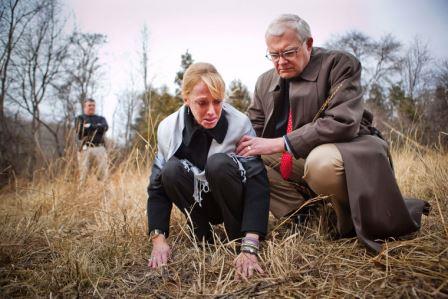
One year ago, when Becky died and the halls were quiet ... when her voice was no more to be heard ... when the sun had set on our marriage ... when the door of her presence had closed .... a man snuggled under his covers at night with these thoughts numbing his mind to sleep:
Blessed are those who are broken,
Blessed are those who have lost what is most precious to them in life,
Blessed are those who are walking through the valley of grief,
Blessed are those whose loss weighs them down and deadens their senses,
Blessed are those whose emotions are so raw and fragile they think they are losing their minds,
For they shall be comforted, upheld, their grief will be turned to joy, there will be a smile instead of a frown, a calmness instead of an edge, rest and sleep will return, and the foundation for this hope, Jesus Christ, will seem more alive and real than ever.
Dan and Gil Harrington's journey was imposed on them. So was mine. It's not one of choice. We can either fight against it or embrace it and make something positive out of it.
You may have noticed that I haven't blogged about Becky in a while. That's because of the goodness of God. He has helped me to progress through this journey with greater comfort and hope than I ever thought possible. Grieving is hard work -- sometimes very hard work. You have been broken, and nothing will ever change that. Two days ago the Bleacher Report ran a story about a high school track and field runner who crawled across the finish line after suffering numerous bone fractures in the last few feet of the race. "I have to finish. I'm doing this for my team," Callihan told Asheville's News 13:
That's me, folks. No matter how cheerful I may seem, no matter how well-adjusted I may appear to you, I am broken. No matter how hard others may try to "fix" me, I am broken. But you see, I don't need to be fixed in order to complete my race. I will crawl across the finish line if necessary.
Thank you, Dan and Gil, for learning from your loss and showing the rest of us what it looks like to overcome evil with good. Once again, I've come to realize that I'm not the only one to feel this way. Recovering from grief is taking a lot longer than I anticipated it would. But it's a great teacher, and I'm learning from it, just as have you, Dan and Gil. You and I will forever be different because of our loss. I pray that if you know God, your walk with Him would also be different, maybe even deeper, like it was with Job.
Friend, whatever loss you're facing today, please keep on running (or crawling). Let's do it for our team. And for our Coach. He is worthy.
Friday, October 17
6:40 PM Today I was on a website in which the "office" of pastor was being extolled. The author insisted that the pastoral office is a special calling and separate from secular employment. He also asked "Who has the last word?" His answer: The pastor, along with other ordained men. (The congregation has no real say.)
What do you think?
At one time I might have agreed (to a degree). But today I see no rigid distinction between clergy and laity. In fact, I would aver that the New Testament teaches no such thing. According to the New Testament, the "ministry" belongs to all God's people. In a sense, this is a point Henry Neufeld is making in his latest blog post. I won't speak for Henry, but it appears that his definition of ministry is based more on the pillar of the priesthood of all believers than on any rigid office divinely ordained by "inviolable decree" (Calvin). This is why the church is the agent of God's kingdom work. But it is more than that. It is the community of God's people regardless of their denominational affiliations. As Henry notes, he and I can partner together even though one of us is a born-again Methodist and the other is a born-again Baptist. He is a Charismatic Christian, and I am not. But we both belong to the same messianic fellowship that functions as a charismatic body. John Howard Yoder (a fellow Basel grad) insists that in the New Testament there is not a hint of a hierarchal ladder whereby one Christian might progress upward from one office to the next.
If we come to the New Testament [he writes] with this "professional religionist" view of ministry, asking "What is said on this subject?" then we can add together some things which Paul said about himself as apostle, some things he wrote to Timothy and Titus about themselves, some other things he wrote to them about bishops and deacons, some things Acts reports about the leaders in Jerusalem and Antioch, salt the mixture with some reminiscences from the Old Testament, and come up with a quite impressive package as the "Biblical View of Ministry" ("The Fullness of Christ," Concern, Feb. 1969).
But then he adds:
Let us take quite seriously the warning of 1 Cor. 12 against trying to establish a hierarchy of values among the varied gifts. This warning is the point of the passage: that there are many gifts is not the chapter's message, for that is self evident, at least in Corinth. Paul's concern is that it be recognized that all these many gifts have the same source, and that all are (each in its place) of the same value.
Obviously, then, in order to be a part of the community of Christ one does not have to see eye to eye on everything that has to do with local church polity. Henry's Methodist congregation has a senior pastor and over him a bishop; my local Baptist congregation has a plurality of elders and deacons. But what matters most to both Henry and me (again, I hope I am not misrepresenting Henry) is that the primary concerns of any local church ought to be proclaiming the Gospel (both by life and by lip) and edifying the Christian community. The calling of the church, then, is to genuinely be the redeemed community of God in this world and then do the works of God by carrying on the works of Jesus Christ. As such, Henry and I are members of the same "church," if you will, in that the priority of the community is important for each of us. Obviously, this does not mean I should try to persuade him to become a Baptist or to espouse my views on church polity. It does mean, however, that "I can edify myself only as I edify the community" (Barth). In fact, I would go a step further and suggest that the very heterogeneity on display when Henry and I cooperate in the work of the Gospel is a demonstration of the power of the very Gospel we are both seeking to proclaim and live. This unity-in-diversity is a hallmark of the community of the King and one I cherish deeply. So, I think, does Henry.
For more, you may wish to read these essays of mine:
Paul and Christian Unity: A Formal Analysis of Philippians 2:1-4
On the Style and Significance of John 17
The Pauline Love Command: Structure, Style, and Ethics in Romans 12:9-21
5:50 PM I saw this over at CNN: The photo of a lifetime. The "lifetime," in this case, is but a few minutes. It's a gut-wrenching series of photos for sure. Being a Christian doesn't guarantee freedom from some pretty severe trials and confusion. But in the middle of the trial God will give you His peace, peace amid the biggest spiritual and emotional wars you will ever fight. Please look at these photos and then say a prayer for every parent you know who has ever lost a little one.
5:38 PM I spent the afternoon with Nathan and his family. Here's Nate with Graham. He is so cute it hurts! (Graham, that is. Nate is on old geezer like his dad.)
Love this pic!
If I look happy, it's because I am.
Cheers!
12:15 PM Can a New Testament Greek teacher be an eclectic linguist? Steve Runge thinks so. What say you?
12:04 PM Signs. It's an odd word. In the New Testament, signs are often the equivalent of miracles. But not always. As you know, I'm reading an excellent book called Strangers to Fire, which I've highly recommended. Wayne Grudem has an outstanding chapter called "Should Christians Expect Miracles Today?" It's a must read. Grit your teeth, because the essay will disabuse you of many wrong ideas you've entertained about signs. For example, Wayne has a long section on 2 Cor. 12:12, where Paul claims, "The signs of a true apostle were performed among you in all patience, with signs and wonders and mighty works." Here, the "signs of an apostle" are not the miracles (signs) mentioned at the end of the verse. Wayne shows how the word "sign" has a much broader range of meaning than just "miracle." He concludes that the signs of Paul's apostleship are something other than miracles, listing the following as examples (all of which are found in 2 Corinthians 10-12):
-
Paul's jealous care of his churches.
-
His selflessness (i.e., self-support).
-
His refusal to take advantage of others.
-
His willingness to suffer hardship for the sake of Christ.
-
His contentment with his thorn.
Imagine that. Paul's Christ-like ministry, his selflessness, his work ethic, his suffering for the sake of the Gospel -- these are proofs of his apostleship! Not so the false teachers, whose lives were marked by pride and selfishness.
What are the signs that you are a genuine follower of the Lord Jesus? "Well, look at the size of my church!" "Nonsense," God will likely snort. The devil tries to dupe us into thinking that success is based on appearance or performance. The price tags have been swapped. You may pastor a church of thousands and have multiple church campuses and make a half million dollars a year; or you may be able to slam-dunk a basketball or fit into a bikini or memorize a catechism and still fail to evidence the signs of true conversion, which may include languishing in prison or having your brains blown out.
What about it? Would there be enough evidence to convict you of being a Christian if you were arrested?
11:32 AM So just how old is p 52? I (and many others) have supported a date of ca. 125. But the evidence may prove otherwise.

(Thanks to DBO reader Craig for the link.)
11:20 AM Good news! "He that hath an ear to hear let him hear." Looks like my left ear will be okay given time. The ENT doctor found no permanent damage. He thinks I will be able to fly again within a month. I can't help but smile as I marvel again at the extravagant way God blesses His children. I can't wait to board that next flight and scrunch up like a sardine as the fine fellow in front of me puts his seat back into my knees!
8:45 AM In Greek 3 we just finished going through half of chapter 2 of Philippians. I am learning so much. Here are a few of my takeaways:
1) The greatest problem in the church is me (2:3). I allow things in my life that dull my spiritual sensitivity and produce carnality and division in the church. Paul calls this "selfish ambition and conceit." The middle letter of "sin" is "I," and it is this Big I that causes most of the trouble in our churches.
2) The ultimate solution to the greatest problem in the church is Christ (2:5). We must have the same mind that was also in Christ Jesus. The secret of the early church is simply that it was Christ-directed and Spirit-filled. We need to return to the absolute sovereignty of the Holy Spirit in our lives and in our churches.
3) The way up is down (2:6-11). Contrary to popular notions, our Father is pleased when His children cease striving after status, recognition, and honors. Our supreme business as Christians is not success but submission. What matters is that we have the mind of Christ, which means, first and foremost, taking a towel and water and washing the disciples' feet. From status to service! From majesty to meniality! From standing tall to bending low! We must live as He lived who took the form of a servant.
4) Obedience is required (2:12). It is not enough to make a good start in the Christian life. Demas started well but ended poorly. John Mark started poorly but ended well (2 Tim. 4:10-11). Let's remain faithful and grow in our obedience to Christ.
5) Obedience is enabled (2:13). It is God who is producing in us both the desire and the ability to do what pleases Him. What would you do for Christ if you could? Or if you dared? God delights in using weak but yielded vessels. Together, verses 12 and 13 take care of a lot of questions about which the saints have differed. At the end of the day, our obedience to Christ is both required and enabled. It is both our responsibility and God's responsibility. All He asks is that we stay in tune with His Spirit.
6) Stop complaining (2:14)! Even when nothing works out according to our plans. Even when things don't make sense. Even when demons dance in glee. We can rejoice and praise God anyhow.
7) Am I "holding forth the word of life" (2:16)? Our business as Christians is not to hoard our blessings but to share them with others. The early church had a deep sense of mission. There are no simpler words to state the responsibility of the church than Paul's words: "holding forth the word of life."
8) Make room in your life for trouble (2:17). We can't preach the cross and not share in it. Suffering is inherent in the very nature of the Christian experience. Jesus grappled with the ugly, the sordid, the hideous, and if we are to follow Him we too must grapple with a bruised and suffering society. Great soldiers are developed in battle, not on parade. Paul poured himself out for others, and so must we. A comfortable Christian is an oxymoron.
8:34 AM "Most class time is not learning. It's stenography." Richard Felder.
8:22 AM There's a good discussion of seminary education here: Stop Blaming the Seminaries. How true -- the lessons of ministry can't be learned in the classroom but must be forged in the crucible of training. If, as Whitehead once observed, the typical graduate student is "overladen with inert ideas" and ill-prepared for real life ministry, no one can blame the New Testament for this sorry state of affairs. Here's hoping you will graduate from seminary with some very radical ideas -- "radical" in the sense of going back to the roots of the faith. For starters, might we reject the notion of the omnicompetent pastor and return to an Ephesians 4 model of equipping ministry? Marjorie Warkentin writes that "the vocabulary of New Testament leadership permits no pyramidal forms, it is the language of horizontal relationships.... Ordination can have no function in such a system, for it sets up barriers where none should exist, that is, between one Christian and another and hinders the mutual service by which the church is edified" (Ordination: A Biblical-Historical View, p. 187).
If we ordain ministers who are fully supported by the church, then we should also ordain ministers who are not -- and that should include all of us.
Thursday, October 16
5:48 PM Read Ten Facts about NT Textual Criticism.
5:38 PM Odds and ends ...
1) Received this email from a friend who lives Down Under:
What a mess you guys are in about the Ebola. Sadly, our own country isn't handling it well either.
Yep. And the Ebola crisis will probably only get worse before it gets better. We were told that the virus would be contained outside the borders of the United States. We were wrongly informed. We were told that the CDC had the situation completely under control. We were misinformed. We were told that healthcare workers in Texas who acquired Ebola had violated protocols. Sadly (mostly for them), they (and we the public) were wrongly informed. (The protocols that were supposedly "violated" didn't even exist in that hospital.) We were told that the "self-monitored" nurse who flew to Ohio and back to Texas was warned not to use commercial transportation. Yet the CDC told her she could travel. My heart goes out to these two young ladies. What happened to them shouldn't have happened. Avoidable mistakes were made by an organization that receives billions of taxpayer money annually to get it right the first time. From now on, medical staff should be allowed to opt out of assuming the risks associated with Ebola patient care. In fact, from now one, the CDC experts need to assume that responsibility. I hope to God the nurses affected survive and that they are the last nurses in the U.S. to come down with the disease.
2) Some good news on the publishing front. My co-editor Jacob Cerone and I are making good headway on landing a major publisher for the Pericope Adulterae Conference papers. I can't share with you the details at this time, but I am excited about where things are going.
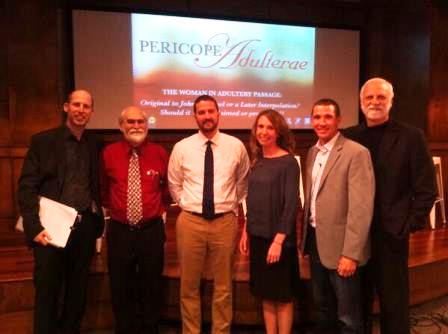
My post-conference report may be found here in case you're interested. As I noted at the time, "the most interesting speaker this weekend was our own Maurice Robinson, whose status among the textual critics present has achieved, it appears, almost that of Michael the Archangel." Yep, the atmosphere on campus was simply angelic.
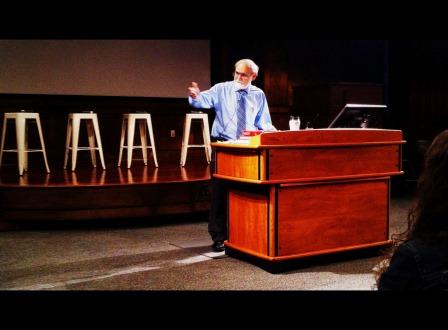
3) At 9:30 tomorrow morning I have my appointment with an ENT specialist. My left ear is still partially blocked though, praise God, there has been some improvement. I'd really appreciate your prayers for healing. In Mark 8, we read about a blind man whom Jesus healed in two stages, which implies that the healing process may require several stages (possibly even more than two) in order for God to accomplish His own purposes. I do know that God answers the persistent prayers of His children, and that He sometimes does so in such a way that people are amazed and begin to glorify Him. So thank you for praying. I'll let you know how things go. I'm pretty much grounded until we can get this thing figured out.
2:20 PM Please go here and support nurse Nina Pham.

1:53 PM To sum up: The CDC has not ruled out a travel ban or travel restrictions from Africa.
1:43 PM Was the staff at Texas Presbyterian trained in how to deal with Ebola? (No.) On Sept. 25 Mr. Duncan told the ED staff he had come from Liberia. Why was he sent home? When he was brought back by ambulance three days later, why weren't shoe covers put on immediately? Medical staff should have been completely covered. 150 people a day enter the U.S. from infected countries in Africa. If our job is to protect the American public, does the president have the legal authority to impose a travel ban for health reasons? Several African nations (as well as Jamaica) have imposed such restrictions. If other countries are doing this, why aren't we? This is not a fail-safe system that has been put into place. (Frieden: If we ban travel, people will come in illegally and we won't be able to track them.) Until the problem is solved in Arica, we can and should say "no" to these people and ban them from entering the U.S.
1:30 PM Questioning of witnesses begins. Why was the nurse permitted to fly? She contacted the CDC and was not told she couldn't. Why was she transferred to the NIH? Why don't we have in place travel restrictions from Africa? Why are we still allowing people to come here? They are not quarantined for 21 days. Why not? This is what happened with the nurse who went to Cleveland.
1:24 PM Anthony Fauci (NIAID Director): A vaccine is in phase one trials. Robin Robinson (HHS): The best way to protect our country is to address the Ebola outbreak in Africa. Several Ebola vaccine candidates exist and are in clinical studies. Luciana Borio (FDA): We're expediting clinical testing within 24 hours of request. The FDA is supporting the WHO. Daniel Varga from Texas Health (by video link): We provide one standard of care for all regardless of race. We made mistakes. We failed to correctly diagnose Mr. Duncan's symptoms. We provided inaccurate information to the public. No doubt, that was unsettling to the public. We don't know how our nurses became infected.
12:52 PM Witnesses have been sworn in. Tom Frieden begins his opening statement. "We know how to control Ebola." "We're open to ideas as to how we can control the outbreak."
12:52 PM The fact is that we cannot guarantee the safety of our health workers on the front lines. We have to learn from the situation in Texas. We need answers to these questions. We have to get this right. Let's learn from our mistakes and not repeat them. This is a wake-up call.
12:45 PM Why haven't we developed an Ebola vaccine yet? The CDC is behind the curve. The response has been too slow and inadequate. People are scared. We need all hands on deck. We need a strategy. This is not a drill. Protocols are being developed on the fly. Little wonder the confidence of the country is shaken.
12:42 PM The American people have lost confidence in the current strategy. We were unprepared. Texas Presbyterian "learned on the fly" how to deal with Ebola. Our approach has been mismanaged.
Good for Congress!
12:33 PM I'm watching the CDC Director Tom Frieden and other witnesses testifying before the House Energy and Commerce subcommittee. The CDC has a lot of 'splaining' to do.
12:22 PM Just preordered Jeff Weima's new 1-2 Thessalonians (Baker Exegetical Commentary on the New Testament).
12:16 PM Something to think about (in light of recent events in Houston):
"The people who are the most bigoted are the people who have no convictions at all." G. K. Chesterton.
12:10 PM Here's yet another reason why I love publishing with Henry Neufeld and Energion Publications: Tentmaking in Silicon.
I no longer look for the time when I will no longer be doing IT work. Rather I consider the IT work as the tentmaking that allows me to pursue the ministry of publishing. Yes, I still run the publishing enterprise as a business. It’s organized on a for-profit basis. I’m not going to start doing fundraising or seeking donations. That’s another thing that I’m freed from by my other business. Sometimes it means I can give books to those who need them.
If you're a blogger, please note too what Henry says about blogging. The more he blogs, the more business he seems to drum up. I'd say something very similar. The more I blog, the more people become interested in things deeper than farming or my dogs. My blog springs from both frustration and hope. At times I can get frustrated with the way things are in the church, which has led me to publish books about what renewal might look like. But I also blog because I have hope -- hope that because of the power of the Holy Spirit of God we can all learn how to follow the Risen One with greater humility and passion. It's hard for me to believe that I've been blogging since November of 2003. For 11 years now I've been trying to set forth what Scripture teaches and how we might respond in obedience. I am very much aware that my blog is a work in progress. I haven't arrived. In fact, there are many reasons for me to quit blogging or for slackening the pace. But, like Henry, I find blogging cathartic, a break from the humdrum of life. If you are a blogger, may I encourage you not to give up? Take some time to develop a list of the biggest obstacles that keep you from blogging regularly. Write them down, then talk to God about them. He's on your side, rooting for you to keep on running the race.
Bless you, my fellow bloggers!
11:48 AM In North Carolina over 2/3rds of adults are either overweight or obese, and rates have only been increasing. The adult obesity rate could reach 58 percent by 2030. So do we really need Twinx?
11:04 AM "The only thing worse than being blind is having sight but no vision. I can see, and that is why I can be happy, in what you call the dark, but which to me is golden. I can see a God-made world, not a manmade world." Helen Keller.

10:18 AM Good morning folks!
Much of human conversation involves questions. "How are you today?" "How did work go?" "What are your plans for tomorrow?" "Do you need a ride home?" Some questions are more important than others. "Will you marry me?" "Is the chemo working?" "What time is the funeral?"
One of the Bible's most memorable questions comes from the lips of Paul when writing to his friends in Corinth: "Do all speak in tongues?" The Greek might better be rendered, "All do not speak in tongues, do they?" Seemingly, Paul is making a statement of fact but couching it in the form of a question. We do this all time with language. When Becky would tell me, "Honey, the trash is full," that wasn't given for my information. What she meant was, "Take out the trash please." After two thousand years the church is still pondering Paul's question to the saints in Corinth. As a Christian, you face the choice every day how you will respond. People seek all kinds of quick-release answers from people who claim the perfect solution, but what we need more than anything is God's perspective on the issue of tongues (and the Pentecostal/Charismatic Movement in general).
Which brings me to this book: Strangers to Fire: When Tradition Trumps Scripture. My copy arrived in yesterday's mail and I have already devoured it. The Foreword states that the book is a response to those who would declare that "Anyone who embraces any form of charismatic or Pentecostal theology does not worship the true God." A war, it seems, has been declared against a deadly virus -- not Ebola but a "deviant mutation of the truth." Even as a non-Charismatic, this language makes me feel a bit uncomfortable. For me, it's a matter of biblical exegesis.
You see, I teach a class on New Testament Introduction every so often, and when I do I cover the tongues issue when we arrive at Acts and 1-2 Corinthians. We have a tendency to gloss over these texts, so most of my time is spent in exegeting specific passages in Scripture -- all of Acts, and all of 1 Cor. 12-14. In addition, we start out with an overview of the history of the Pentecostal Movement (beginning in the second century) before we even get to the text. The total lecture series lasts about 6 hours. Then, and only then, are my students given a 4-page handout containing my own personal conclusions on the debated issues: the nature of tongues, the question of cessation, prophecy, miracles, etc. Of course, the easy solution is just to tell people what we believe (the "truth") and leave it at that. The problem is that we Christians are human and fallible, and if our Christian doctrine isn't rigorously based in the exegesis of actual texts, it is very likely contaminated.
I think intellectual naïveté is partly to blame for the faulty understanding of spiritual gifts that plagues the church today. I think it's also true that a great deal of misinformation is popularized by people who stand to profit from it. Publishers are all too eager to sell us a dizzying array of cheap (in both senses of the word) books that do little more than perpetuate our own built-in biases. For example, I was educated to believe that verses like Eph. 2:20 and 2 Cor. 12:12 taught cessationism, when in fact they do nothing of the sort. Popularizing these beliefs may be good for the bottom line, but the more misinformation I've become aware of over the years, the more dissatisfied I find myself with some strands of evangelical scholarship. I've seen firsthand the power of the Holy Spirit in my 17 visits to Ethiopia, and to dismiss all of this as the work of the devil is a bit too much for me. It's a dramatic moment when you realize that God still uses visions and miracles for evangelistic purposes in some parts of the world today.
And so I have changed over the years. Change is a good time to mature. This means that you realize that your teachers growing up weren't perfect. They were people just like you: people seeking the truth but inclined (because of their human nature) to wield a little too much power for themselves. We want to be seen as the Big Kahuna, to be honored and esteemed, but the Bible has quite a different emphasis: "Whoever wants to be a leader among you must be your servant." So please do not read this book -- unless you have a teachable spirit. As Mark Rutland writes (p. 5):
One cessation writer blogged, "Some of my best friends are charismatics." I mean, really? It is always the most prejudiced who claim that among their "best friends" are blacks or Jews or whomever it is they then proceed to defame. Such a statement is simply an insult.
"Be humble, thinking of others as better than yourselves," writes Paul to the Philippians. "You must have the same attitude that Christ Jesus had." Remember, we follow a Lord whose attitude got Him killed, not crowned. So there is no place for arrogance. Nor, however, is there a place for false humility. These are issues that must be carefully examined and grappled with. It will not do to simply go with the traditions we were taught in school. Malcolm Muggeridge described the concept this way: "To believe greatly, it is necessary to doubt greatly." And that's just what the authors of this book have done. Doubts led Craig Keener to write his excellent chapter, and skepticism underlies the indispensable contributions by Wayne Grudem, J. P. Moreland, and Gary Shogren -- evangelical scholars of the highest rank. In his book Wishful Thinking, Frederick Buechner describes the doubts we face as "the ants in the pants of faith." My prayer is that the ants in your pants will thrive and increase. Don't settle for a position that is unworthy of the Holy Spirit. The fact is, no part of the body stands alone. Each and every part is critical to the whole, and the gifts of God are sovereignly dispensed.
Wednesday, October 15
9:15 AM Last night I had a great time at Mt. Olive talking about missions and the work that the Lord Jesus is doing in Africa. I had a wonderful time!
Several people told me afterwards that they were completely unaware of the persecution taking place in the Horn of Africa. There were a trillion things I could have talked about but I decided to focus on Phil. 1:27 and how we as Christians are to be involved in what concerns God the most -- global evangelization. How in the world can we call Him Lord unless we are seeking to carry out His orders and finish the task He began on the shores of the sea of Galilee? Again, we had a wonderful time together, and the conversation will continue. I had several people interact with me deeply after the service, though I suppose the statement I will never forget was when one lady told me,"You'd make a good comedian."
Here's a big picture:
I mean, how often do you get to sit next to a man in chapel whom you so deeply respect and love? M. O. Owens is hands down the most beloved centenarian I know. Statistically speaking, I'm three-fourths of the way to meeting the Grim Reaper. Will I remain committed over the long haul? Stay awake? Never stop thinking and learning and growing? I hope so. As eternity approaches at the speed of sound, I'm going to keep sharing the mystery of the Gospel with others, commit to pursuing truth with childlike curiosity, and doing all I can to glorify the Designer and Completer of the race I'm involved in.
Oh, this weekend I begin a series of talks with a great church family near Wake Forest.
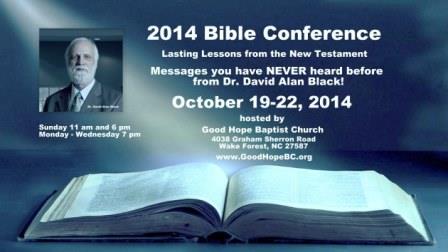
Crazy busy days for me, but I love everything I'm doing!
Tuesday, October 14
5:40 AM Neat parsing app here:
5:32 AM Wikipedia has an entry on textual variants in the New Testament. Looks pretty good. One notable gap: no mention of the significant variant in John 3:13. (I have defended the longer reading.)
5:22 AM SEBTS Ph.D. graduate Matt Emerson shunts us to an old siding: the use of the Old Testament in the New. He is full of fertile ideas on the subject. When someone uses the word "convoluted" you know something's afoot.
Monday, October 13
9:10 PM In April 2012 I had the surprise of my life when I was installed as the Dr. M. O. Owens Jr. Chair of New Testament Studies at SEBTS.
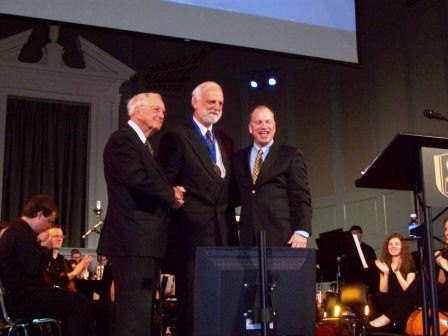
Dr. Owens is now 101 years young. In chapel tomorrow I will sit next to him and thank him again for his kindness and generosity both to me and to the seminary -- that is, if I don't get too tongue-tied. I'm so glad that God can turn our disabilities and self-doubts into blessings. If you're in chapel tomorrow, please join me in shaking Dr. Owens' hand and expressing your appreciation to him for what he has meant and still means to the kingdom work that God is doing on our campus and through our students around the world.
8:20 PM My good friend Henry Neufeld has just posted a wonderful testimony to the impact one of his mentors had in his life. Do take a moment and read it, especially if you think you'll ever find yourself in the (somewhat scary) role of mentor to others. There are so many quotes I could pull from Henry's post, but this one jumped off the page:
In 1957, Leona was accepted into the PhD program at Johns Hopkins University. She was interviewed by the renowned biblical archaeologist William F. Albright, who sat her down and began talking to her in Spanish, switched to French, then German and finally English. By the end of the conversation, Albright told her that she had passed her entrance exam.
Wow. That is amazing. Shouldn't a doctoral program have those kinds of expectations? As I said a couple of days ago, lasting change is built by laying a firm foundation of stone upon stone upon stone. It takes lots of time, sacrifice, dedication, and work. My prospective doctoral students know that Greek, Hebrew, German, and French (and maybe Latin as well) had better be more than ancient history to them should they ever want to graduate under my tutelage. In fact, I am mentoring a doctoral student tomorrow (as I do every week) and he will not be surprised in the least if I begin by having him translate German into English.
Kudos to William F. Albright and his successors. May their tribe increase!
8:02 PM A "friend" sent me this email tonight:
Something tells me you will want this new release from Thomas Nelson!
http://www.thomasnelson.com/the-maxwell-leadership-bible-niv
I had a one word response:
Aaaaaarrrrgggghhhh!!!!
2:40 PM If you're as interested in the Gospel of Mark as I am, then you'll certainly be interested in this Survey of Surveys on Mark.
2:33 PM Talbot School of Theology announces an opening in systematic theology.
12:44 PM As always, I appreciate the insights of Henry Neufeld when it comes to the biblical languages. In a recent email exchange (dealing with verbal aspect this time), he wrote:
I have no trouble teaching verbal aspect from your grammar or Mounce's. I always expand on this to the students and discuss the difference between the aspect and the time, and so forth, but I give them the simplified discussion as an anchor point. It's similar, in my view, to learning the gloss of a word as vocabulary, when you know very well that the gloss doesn't really tell you what that Greek word means any more than giving a synonym (always NEAR synonym of an English word is the same thing as providing a definition or a set of definitions. Verbal
aspect itself has a semantic range, i.e., it doesn't work itself into
neat categories as we'd like it to. Instead, it is rough around the edges.
A few random reflections:
1) Standard terminology in any field is a desideratum. This is no less true of Greek grammar than it is of horticulture (in which I have dabbled a bit). However, at the beginning level of any subject, some oversimplification is unavoidable.
2) At the same time, the goal is comprehension and especially the ability to read Greek. Henry reminds us that there are sometimes more than one way to "get there." An example might be teaching -omen and -ete instead of -men and -te as the primary active suffixes in the first and second person plural. In my view, only the latter approach is linguistically defensible. But what does it matter in the end?
3) At other times, there are "hills to die on." We all have these I suppose, and for me I'd have to include the debate over time in the Greek verb system. As I've previously noted in this blog, I still believe that the Koine Greek verb system grammaticalizes time in the indicative mood -- and I say this despite the noble attempts of several prominent Greek scholars to dissuade me. Why, I even call the prefixed epsilon the "past time morpheme"!
4) Thus, to paraphrase Henry, flexibility is needed at all times, and wherever there is significant debate, we must be willing to help our students negotiate the muddy waters.
5) I'll let Henry have the last word, to which I say a hearty "Amen!"
I agree with the way you do this [teach verbal aspect] in your text, though again I would say that a good teacher can expand on the text. If the teacher is stuck with the text, in my view, he has no business teaching. I've read a number of other grammars, so I can take elements that work for me and use them to help students. A teacher should be teaching well beyond the text. The text is what reading is for.
10:40 AM I love my dogs. Every time I let them in the house they go crazy and I laugh my head off. It's like watching NASCAR as they chase each other at a hundred miles an hour. Occasionally I'll mimic a play bow (front down, rear up, smile on face) and then they jump right in to play. They always expect a treat. In fact, if you think that dogs can't count, just try putting three treats in your pocket and only giving them two. To his dog, every man is a hero. I love my dogs the best.
10:20 AM Was Jesus hung on a "tree" or a "pole" or on what? Bill Mounce discusses this question here.
9:58 AM Good morning my intellectual internet amigos!
I hope you saw last's night announcement about Rod Decker's textbook. Yes, I'm actually promoting this book even though I've written my own beginning Greek grammar. And why not? I've always found it interesting to watch how different minds tackle the same problem. Someday, praise God, we'll no longer have the need to study languages – any language. But in the meantime, we still have to put our collective nose to the old grindstone, and because each of us learns in different ways, we will probably end up using different textbooks. The one thing all of us teachers of Greek have in common is a love for the language and an irrepressible joy when we see our students finally "get it." But none of us would claim that we have the last word when it comes to grammar or even pedagogy.
This morning I'm still mulling over the matter of verbal aspect. What in the world shall we call the three (or two) aspects? For what it's worth, Id like to share a few brief comments with you in the hopes of nudging the conversation forward.
1) In the first place, as I read Joshua Covert's excellent summary of recent approaches to the problem – and the wide variety of terms used to describe the aspects – I'm more convinced than ever that this is a real problem for Greek scholars and students alike, and it's frankly beautiful to watch the discussion proceed. For our students' sake (at the very least), we need to work towards some kind of agreement or standardization, don't you think?
2) Secondly, I think the elephant in the room has yet to be discussed. It seems to me that a major part of the problem, if not the biggest challenge we face, is the fact that Greek teachers and linguists are often talking past each other. Each of us approaches the problem from a different set of perspectives. For the Greek teacher, for example, pedagogy is often paramount. Moreover, most of us have little or no formal training in the science of linguistics. This doesn't mean that we aren't interested in what linguists are saying. We are. It's just that we don't always feel that we necessarily have to follow their explanations or terminology. I'll give you one example from an email I received yesterday. The author wrote:
According to the online Encyclopaedia Brittanica, the perfect is stative:
http://www.britannica.com/EBchecked/topic/286368/Indo-European-languages/74555/Vowels#74556
The imperfective aspect, traditionally called “present,” was used for repeated actions and for ongoing processes or states—e.g., *stí-stH2-(e)- ‘stand up more than once, be in the process of standing up,’ *mn̥-yé- ‘ponder, think,’ *H1es- ‘be.’ The perfective aspect, traditionally called “aorist,” expressed a single, completed occurrence of an action or process—e.g., *steH2- ‘stand up, come to a stop,’ *men- ‘think of, bring to mind.’ The stative aspect, traditionally called “perfect,” described states of the subject—e.g., *ste-stóH2- ‘be in a standing position,’ *me-món- ‘have in mind.
Now think about this. According to Britannica, "The perfective aspect, traditionally called 'aorist,' expressed a single, completed occurrence of an action or process…." This will not do. Ever since Frank Stagg published his essay "The Abused Aorist" in JBL (followed up later by Charles Smith's "Errant Aorist Interpreters" in GTJ), teachers have been cautioning their Greek students never to view the aorist as referring to a "single" action. Yet still today one hears statements, in both sermon and commentary, such as "The aorist here shows that Paul had in mind a once-for-all-action." Much of this confusion stems (I believe) from A. T. Robertson's use of "punctiliar" to describe the aorist tense. Of course, Robertson never meant us to understand a "once-for-all action," yet the term "punctiliar" was easily misunderstood to mean that very thing. After all, something that is "punctiliar" has one single "Punkt" or "point," doesn't it? My point here (no pun meant) is simply this: While Greek scholars are obliged to learn as much as they can from linguists (and I, a non-linguist, have even published two books on the subject: Linguistics for Students of New Testament Greek, and Linguistics and New Testament Interpretation), they are not obligated to follow linguistic science blindly.
3) In the third place, I’m not sure we are as far apart as the evidence may seem to point. For example, the two most widely used beginning grammars in North America today (mine and Bill Mounce's) have somewhat similar terminology, as Joshua noted in his post:
Mounce:
Completed (also called perfective)
Continuous (also called imperfective)
Punctiliar
Black:
Perfective
Imperfective
Aoristic
As I stated above, I prefer "aoristic" to "punctiliar" because of the way the latter term has been abused by preachers and commentators. "Aoristic" works because its meaning is "undefined." In other words, by choosing aoristic aspect, an author is intentionally refraining from trying to describe how an action occurred. The action is a-oristos – "unlimited" or "undefined" in terms of its kind of action. This is precisely the point that was made by both Stagg and Smith in their journal articles.
4) Finally, let me just state why I still prefer my terminology. It comports with conventional usage by traditional New Testament grammarians. (Wow. I can't believe I just made that statement. If there ever was a person who enjoys challenging conventional wisdom, it's yours truly.) Think about how easy we make it for our students when we say that the imperfect tense has "imperfective" aspect, or that the perfect tense has "perfective" aspect, or that the aorist tense has "aoristic aspect." Incidentally, K. L. McKay, in his A New Syntax of the Verb in New Testament Greek, uses "aorist" as I do "aoristic" and labels the other aspects "imperfective" for present and imperfect and "perfective" for perfect, so I am not exactly alone in my nomenclature. (Profound thanks to my friend Craig for pointing this out to me.) Now don't get me wrong. I'm willing to change my nomenclature if I can be convinced to do so. Indeed, Robert Picirilli, in a JETS essay that appeared in 2005, makes a suggestion I am almost happy with. Addressing the "issue of terminology," he writes:
I think we must recognize that it is too late in the game, as A. T. Robertson said long ago, to change the names of the tenses or the word "tense" itself. It is hard enough to teach Greek students that "tense" does not meantime and "present" does not mean present; but we have learned to handle that. If aspect theory is to win wide recognition and usage, as I think it should, I believe we must develop a terminology that does not overlap with those names and is both appropriate in meaning and relatively easy for students to learn and use. I tentatively suggest, then, that "progressive" works better than "imperfective" and that "wholistic" works better than "perfective." I have no suggestion as a replacement for "stative." From this point on, then, I may speak of aspect or perspective, and of progressive perspective or imperfective aspect (for the present and imperfect tenses), of wholistic perspective or perfective aspect (for the aorist tense), and stative perspective or aspect (for the perfect and pluperfect tenses).
"Wholistic" may well work better than "aoristic," and I’m open to using that language, though I still feel it's too confusing, from a purely pedagogical standpoint, to use "stative" for "perfective."
In the meantime, I hope you're enjoying this gentlemanly debate as much as I am. I enjoy having my ideas challenged. Indeed, I've organized many conferences at SEBTS to discuss the synoptic problem, textual criticism, the ending of Mark, etc. and I'm wondering if it might be a good time to hold another gathering in which we could spar with each other over this matter and maybe, just maybe, come to see eye to eye. As in many other matters, on the issue of verbal aspect we have to say "Let the discussion continue!"
Sunday, October 12
9:18 PM Mrs. Linda Decker (Rod's wife) just emailed me to say that her husband's Reading Koine Greek (Baker Academic) is now in print.
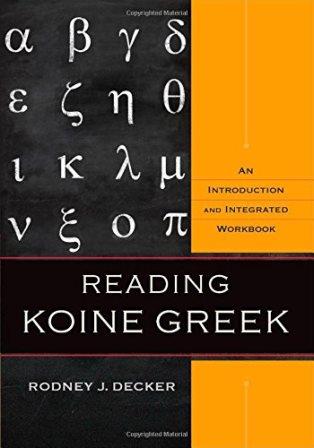
Praise the Lord. I am so grateful to God. If you're anything like me, it's impossible to think of the name "Rod Decker" without also thinking about Greek. Greek was serious business to Rod, and the world is a better place because of it. I wish the book well and pray that it receives the wide readership that it most certainly deserves.
8:52 PM Back to 1 Thess. 1, but with a wholly different twist (with a nod to Henry Neufeld's very latest). Paul is trying to show us in 1 Thess. 1:2-5 that redemptive people are always winsome. They do not beat people into submission by arguments. They are like a fragrant and attractive aroma. Beauty attracts people to the Gospel. Logos, ethos, and pathos must all be present. Logos is the message that must be verbalized. But words are not enough. As Paul writes, "I did not come to you in word only." Ethos speaks of our character, pathos of our compassion. Paul had pathos as evidenced by his "power, the Holy Spirit, and full conviction." Finally, ethos was also indispensable to his ministry. His selfless life backed his evangelistic message. As he tells the Thessalonians, "You know what kind of people we were when we lived among you. We did everything for your sakes."
Effective evangelism combines truth (logos), integrity (ethos), and love (pathos). In other words: no serving, no winning. I have to admit that when it comes to serving, my faith gets thin. I am not a servant by nature. I am a getter, not a giver. My old nature says, "The way up is up," but with God the way up is always down. Like his Master, Paul was powerful because he chose to be a towel wearer and a basin bearer. It's an interesting paradox, isn't it? Christianity's greatest leaders have always been people of the greatest humility. I am learning to live my life with a giving spirit (and I still have a very long way to go!). I am learning that love and service in the name of Jesus is what it's all about. I am learning to jettison anything that might detract from the mission, good as those things may be.
Henry is right. People are vulnerable to love, not to academic titles.
5:56 PM Am preparing dinner for my daughter Karen and two of her roommates from DC. I hope their digestive systems survive the evening. They will leave here after dinner for Charlottesville to do some apple picking on the morrow.
5:47 PM More on 1 Thessalonians 1 from Henry Neufeld's ever-capable pen (keyboard).
5:25 PM Yesterday someone gave me this book.
I really didn't want to accept it, as I am not a huge fan of the author or of books on "leadership" in general. I asked, "Is it based on Scripture?" The reply came back, "No, he doesn't use Scripture, but his principles are all scriptural." Well, I read the book this afternoon. Not once is the Bible quoted. Not one time. To be sure, there are plenty of quotes in the book. Cited are George Barna, Teddy Roosevelt, Gandhi, Harold Kushner, Stephen Covey, John Wooden, "Bear" Bryan, Socrates, and even Machiavelli. But not a word from the apostle Paul or from Jesus Christ. Take a minute and think of those people who had the biggest impact on your life. I dare say they were people whose lives were steeped in the Scriptures. Everywhere you look in the Bible, there are principles of leadership. When I first became a Christian I read everything I could about the Bible. I then discovered that nothing is better than reading the Bible itself. No, I'm not against reading (or writing) books about the Bible. But a book on leadership without a clear biblical foundation has cosmic implications. At least it does to me.
3:04 PM Good afternoon, blogging friends!
Well, I'll start by saying I had a wonderful time at the fellowship today. We've begun a series on Philippians and Jason did a phenomenal job of walking us through the first 11 verses. Umm ... is this one of my favorite New Testament books or what? But don't get me started...!
Moving on, there are three posts (two of them about Greek) that I want to call to your attention today.
1) In the first, "New Testament Greek Geek" Joshua Covert discusses the confusion engendered by something Rob Plummer said in one of his videos. Read Verbal Aspect and then tell me what I should do. I don't want to be guilty of being out of sync with modern scholarship, but is there really a standard nomenclature to describe verbal aspect today? It's all very complex. Maybe you'd like to share your thoughts at your website.
2) Second, do read what Henry Neufeld has to say about the can of worms we opened up the other day about the structure of 1 Thessalonians 1:1-10. (Okay, I feel vindicated.) Why don't you try analyzing the passage on your own and see what you come up with? And consider not accepting the paragraph divisions you find in your Greek New Testament or even in your favorite commentary as being Gospel truth.
3) Finally, Craig (over at "The Trinitarian Dance") offers his thoughts about gay marriage. Folks, I'm all for calling sin "sin," but I'm also for following Jesus' example. We're to place our trust squarely in the power of the Gospel to change human lives. As I told a friend the other day, even if gay marriage becomes legal, the Gospel has the power to make it unthinkable.
Blessings on all of you, and remember to look hard at whatever subject you're dealing with, whether it's a problem of Greek grammar or a pressing social issue.
Dave
10:14 AM Good lecture here on New Testament textual criticism from Cambridge University. (At the end, an audience member asks a very interesting question about gay marriage and women bishops and how textual criticism might bear on these matters.)
8:58 AM This story at the BBC caught my eye: How English beat German as language of science. I had no idea that, after WW I, speaking German was criminalized in the U.S. Bad on us. Today, I'm hearing more and more English expressions when I visit Germany and Switzerland: Googeln, der Icebreaker, Fastfood, das Basement (instead of Untergeschoss), and, of course, gedownloaded. On the other hand, a cell phone is a Handy, and cash is still Bargeld (except where "Cash" is used -- go figure). Babel really messed things up big time. But I'm not complaining. After all, teaching a foreign language ist mein Brot und Butter!

Saturday, October 11
2:20 PM Read Thoughts on Gay Marriage in NC by a North Carolinian. Excellent observations!
12:54 PM Quote of the day (Greg Laurie):
"I believe all roads lead to God. I don't care if you're a believer, agnostic or an atheist. I believe whatever road you're on, you will get to God one day and you will stand before God one day. All roads lead to God. But only one road leads to heaven, and that's the road through Jesus Christ," Laurie asserted.
"Your soul lives on in the afterlife. Everyone is going to die. You decide what you will do with this life, and you decide where you will spend the afterlife. I hate to break it to you," he said, "but there are only two choices: heaven or hell."
12:45 PM The guys are eating. Again.
Yep, we're Baptists.
12:35 PM Just ordered this tome.
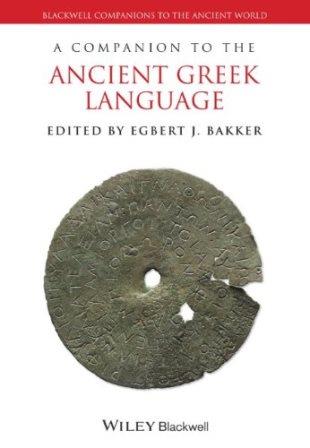
It's got chapters on phonology, morphology, syntax, semantics, and the papyri. Looks like a gem.
11:22 AM This is for all you Latin Geeks out there. Go here and translate the first paragraph into English for me. You may use helps. The first one to send me the correct translation receives a copy of It's All Greek to Me: Confessions of an Unlikely Academic. Be sure to include your mailing address. Have fun!

10:50 AM The responses about the structure of 1 Thess. 1:1-10 have begun coming in. Here's the most recent email (I've taken the liberty of transliterating the Greek):
... I think dividing the text in this manner completely ignores the structure of the passage. The main clause is in 1:2 (we give thanks), the three participles in 1:3 and 1:4 describe how Paul gives thanks and why, the hoti clause in 1:5 provides a reason for why Paul knows the Thessalonians are chosen by God. Though some divide at v. 6, I think that there is an elided hoti and that the statement "you became imitators of me" is a second reason for why Paul knows they are chosen by God. The rest of the section (through 1:10) provides more info about 1:6.
"Completely ignores" is pretty strong language. What do you think?
10:36 AM The stupidest money mistakes you can make. I would add, "Failing to pay off your debts in a timely manner."
10:28 AM The sun is shining again! Hurray!
10:26 AM Want to teach New Testament at Oxford?
10:18 AM In my essay in the Southern Baptist Journal of Theology called The Literary Structure of 1-2 Thessalonians, I tried to show how 1 Thessalonians is comprised of several fairly clearly-defined thought units:
The Greek text of 1 Thessalonians consists of 18 paragraphs (thought units) that together merge to communicate Paul's message. Read each paragraph and then assign a title to each (a paragraph title is a summary in your own words of the central idea in the paragraph). The paragraphs are: 1:1; 1:2-10;2:1-12; 2:13-16; 2:17-20; 3:1-5; 3:6-10;3:11-13; 4:1-2; 4:3-8; 4:9-12; 4:13-18; 5:1-11;5:12-22; 5:23-24; 5:25; 5:26-27; 5:28.
I say "fairly clearly-defined" because some may quibble about this or that paragraph division. For example, some prefer to see two paragraphs in 1:2-10 instead of a single unit: 1:2-5 and 1:6-10. But I think all would agree that 1:1 is set off from what follows as the letter's opening salutation, and I think all would agree that the next thought unit is either 1:2-5 or else 1:2-10.
It was therefore a great surprise to me to read this morning that one of the latest commentators on 1 Thessalonians begins his forthcoming treatise with a discussion of 1:1-3 (see the sample here). I simply do not see how this is possible on the basis of Greek discourse analysis. Verse 4 begins with a subordinate clause (a participle in Greek) that is clearly attached to the head verb in verse 2. So again, while I suppose one could argue for a paragraph break between verse 5 and verse 6 (since verse 6 contains a finite verb), I am at a loss to explain how one could begin a new thought unit at verse 4. I suppose arguments may exist along these lines, but I am unaware of them. Perhaps the author could enlighten us?
To get the ball rolling, here's how I understand "Wie der Text spielt" in 1:1-10:
The first chapter is comprised of two paragraphs and follows closely the standard letter writing convention used by Paul elsewhere: Greeting and Thanksgiving. The train of thought in these two paragraphs may be indicated as follows:
Opening Greeting 1:1.
The introduction gives the names of the writers and readers, and a salutation. The form is conventional but it has been Christianized (cf. the introduction to Romans [1:1-7], which has been richly “clothed” with doctrine; cf. also Gal 1:1-5). The introductions of the Thessalonian epistles are Paul’s briefest. Significant here is the absence of “apostle” to describe Paul. As in other letters Paul joins his helpers’ names to his own in the address. The church is then designated and greeted with the typical Pauline expression “grace and peace.”
Thanksgiving for the conversion and zeal of the Thessalonians 1:2-10.
In the Greek text, 1:2-10 is one long, awkwardly constructed sentence that is difficult to punctuate and that is loaded with adverbial phrases that are hard to place. If the paragraph is difficult it is also vitally important to the author’s argument. In the form of a prayer of thanksgiving, Paul brings together two themes: (1) the manner in which Paul and his colleagues shared their faith with the Thessalonians (vv. 2-5), and (2) the response of the Thessalonians to the missionaries’ preaching (vv. 6-9).
Because of this shift in emphasis, it may be useful to make a paragraph break at the end of v. 5. Secular Greek letters sometimes included in their introduction a prayer to some god, but not often a prayer of thanksgiving. Paul regularly does so (Galatians is an exception), but the theme of gratitude goes far beyond a mere introduction. Paul uses the thanksgiving (1:2-10) to relate the most important themes of the letter body that follows, though “thanksgiving” in our letter appears to be much longer (1:2-3:13) than in Paul’s other letters.
What is the specific content of this rich paragraph of thanksgiving? Hiebert divides it as follows: (a) Paul first sketches the character of the thanksgiving with various statements (v. 2) and then (b) elaborates three specific grounds for the thanksgiving (vv. 3-10). Paul’s thankful spirit for the Thessalonians is prompted by their Christian virtues (v. 3), their divine election (vv. 4-7), and the reports of others concerning the church in Thessalonica (vv. 8-10). According to Hiebert, “this elaboration of their grounds for thanksgiving forms an adequate background for the remainder of the epistle.”
Best’s overall analysis of 1:2-10, however, seems to unite the thoughts of the paragraph better. His explanation may be summarized as follows: (a) Paul thanks God for the way in which the Thessalonian converts have expressed their faith (v. 3) and (b) for its ultimate ground in God’s choice of them as Christians (v. 4). This choice was (c) made clear in the successful ministry by Paul to Thessalonica (v. 5) and (d) in their response to the gospel, despite tribulation (v. 6). They (e) became an example to others (v. 7) and (f) a spur to evangelical activity (v. 8) by their complete acceptance of the faith, whose content is (g) expressed in a creedal form (vv. 9-10). This last statement concerning a “creedal form” indicates a common opinion among NT scholars that Paul in 1:9-10 is quoting a pre-Pauline statement of the church’s faith.
Your thoughts? Care to blog about it?
9:38 AM Witness the first gay marriage in Wake County. What is your Christian response? What ought it to be?
8:55 AM Few topics are more interesting to me than pedagogy. Yesterday, as you know, I interviewed a prospective doctoral student who is interested in possibly studying under my tutelage at SEBTS. One of the main matters we pondered together was the question of seminary versus university. I forgot to mention to him a book by Nijay K. Gupta called Prepare, Succeed, Advance: A Guidebook for Getting a PhD in Biblical Studies and Beyond. It's reviewed here. The reviewer makes this interesting comment:
Chapter 1 (“Choosing a Doctoral Program”) deals with the very initial stages of pursuing a PhD degree. Here Gupta delineates six factors that he thinks students should consider before choosing a program (theological orientation, prestige/difficulty, money, time, location, and library), though to this list I would like to add another factor: cohort-size.
Now, I don't mean to be a scrooge, but my take is slightly different. Let's walk through these 6 factors one by one:
1) Theological orientation. I did not attend the University of Basel for my doctorate because of its theological orientation. I chose Basel because it was a truly "liberal" institution. That is, they were truly open-minded even to the point of gladly accepting conservative American evangelicals from non-descript seminaries (like Talbot) into their program, as long as these students could produce a quality piece of scholarship. This version of "liberalism" is, I'm afraid, sorely lacking in many North American universities, or at least it was when I was contemplating my doctorate in the late 1970s. Conservatives often found it difficult to enter these programs and, if they did, ended up having to write their dissertation on a "safe" topic. I found the atmosphere in Basel a refreshing departure from this attitude.

2) Prestige/difficulty. In the 1980s, Basel was still one of THE places to study for a doctorate in theology because of its outstanding world-class faculty. As for difficulty? Studying there was challenging, not least because you were studying in German and because their foreign language standards were extremely high (one was simply expected to have a knowledge of, say, French, Latin, and Dutch). Choose a doctoral program that will stretch you both as a person and as a scholar. You will be better off for it.
3) Money. Becky and I were living in Southern California at the time where the cost of living was outrageous. And here we were about to live in a country whose cost of living was about four times higher and where neither us could work during our sojourn there. How were we able to cut it financially? Well, I like to put it this way: "The Lord miraculously provided." And He did. Becky worked two jobs and I worked three prior to our departure for Basel in 1980. You say, "What was miraculous about that?" When you think about it, isn't the ability to work just as much a miraculous provision of the Lord as if He had plunked down in our bank account several thousands of dollars? My point it this: If God wants you to study in Cambridge, don't worry about the finances. He can and will provide. Trust Him.
4) Time. It took me three years to complete my doctoral studies at Basel, which was about average.
5) Location (location, location)! Yes, yes, yes! As I told my prospective student yesterday, "Studying abroad will give you two educations for the price of one." In addition, if you can study in a foreign language (such as German or French), you will be forced out of your comfort zone big time. "Ich bin hierher gekommon, um Land und Leute besser kennenzulernen," was my usual response when the Swiss asked me why I wanted to live in their country. And I meant it. Becky and I both thoroughly enjoyed becoming familiar with Switzerland and its people and customs. Try it. You might like it as much as we did.
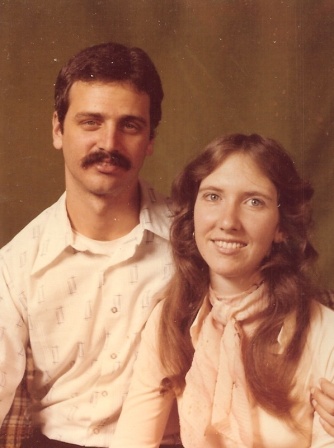
6) Library. Well, this was a no-brainer. The University Library in Basel boasted several million volumes. In addition, the Theologisches Seminar at Nadelberg 10 had its own theological library, unlimited access to which was provided to doctoral students. Moreover, if I didn't find what I was looking for in Basel, it was a short train ride to Freiburg or Tübingen to use their outstanding libraries.
7) Here I'm going to add a seventh desideratum if I may: Mentor/major professor/Doctor Father. This is what made Basel a bit more attractive to me than Tübingen (where I had also been accepted). Bo Reicke was the doyen of New Testament studies in his day and, to me, embodied the perfect complement between humanitas and pietas.
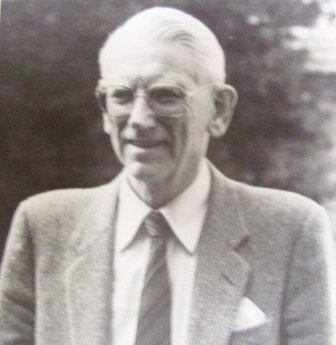
I lived in his home the first month I was in Basel and was granted access to his personal library during the entire course of my studies under his tutelage. It never occurred to me to study anywhere else, so happy was I on the shores of the Rhine in this ancient city of refuge for unconventional thinkers like Erasmus and Calvin.
So ... do consider a European doctorate. This goal has been successfully pursued by countless North Americans. One of my former Th.M. students is currently completing his Ph.D. in New Testament in Munich. Another one of my former doctoral students is currently working on a second doctorate (in Spanish) at the Complutensian University in Madrid.
It can be done!
7:56 AM Bible Conference this week at Mount Olive. If you're in the area, come on.
Friday, October 10
7:34 PM Pleased as plum to host the elders of a neighborhood church for a two-day retreat.
6:21 PM I'm running across more and more blog posts about tithing. I think that's pretty newsworthy. Our reactions to tradition may not be very dramatic but our response can either drive us further from the truth or bring us closer to it. As head of His church, Jesus Christ has organized His body in such a way that its members freely and willingly give as led by the Spirit. There are plenty of books that treat this subject biblically, but might I recommend one to you? David Croteau's Tithing After the Cross is an eye-opener. It's subtitle will give you an inkling of its contents: "A refutation of the top arguments for tithing." It's certainly not an easy topic. But it is a matter about which God has clearly spoken, and He demands an obedient response, doesn't He?
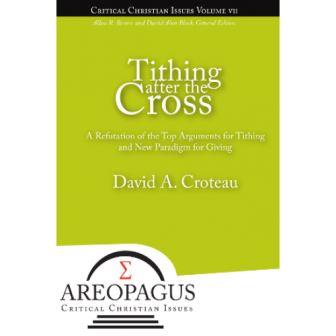
5:20 PM "Don't tell grievers to 'move on'." Right on, Kay!
4:57 PM Getting caught up on your emails. Thanks for your patience. It's been a busy day email-wise.
1:33 PM If you've ever struggled with the balance between holding firmly to your convictions while at the same time maintaining a teachable spirit (as I certainly have), go here.
1:22 PM Just met with a prospective doctoral student. Prepared lunch for him. I hope he doesn't think my teaching is as bad as my cooking.
10:43 AM This past April, the Lausanne Global Consultation held a presentation on the New Apostolic Reformation Movement titled "Prosperity Theology, Poverty, and the Gospel." Click here to watch the presentation (Spanish, with English translation). It discusses the role of Neo-Pentecostalism in Latin America (think Peter Wagner). The video will remind you that the Bible alone is God's word and the final arbiter of truth. Of course, you can also practice your Spanish at the same time.
By the way, have you seen this new book: A New Apostolic Revolution? It's due out in November. My thanks to DBO reader Craig for calling it to my attention.
8:48 AM This and that ...
1) Yesterday on the Diane Rehm Show a caller referred to PTS without the "D." The tendency today is to call PTSD a syndrome or simply to refer to it as Post Traumatic Stress. I applaud that move. It not only removes an unnecessary stigma, but perhaps it will help more people seek help. Shell shock is normal when you have been in combat. Likewise, may I say to those who are grieving the loss of a loved one (whether a spouse or a baby in the womb): if you ended up being traumatized, it's not because there is something amiss in you. The event was the abnormal thing, not you. Grief is legitimately expressed through mourning. It is a natural, normal process. It's actually God's way of helping us cope with the stresses in life. You will never get over the trauma or the loss. But you can learn how to manage it. You can still get up out of bed every day. Just deal with the pain a little bit at a time. Accept the changes that loss brings into your life. Don't worry about what is "correct" or "healthy." Everyone experiences grief uniquely. But eventually your grief will turn to joy. Believe me. I know.
2) I spent yesterday evening with two of my favorite people.
Jon and Matthea met me at Firebird's Restaurant in South Point Mall and we enjoyed a delicious dinner together. (Their prime rib is the best I have ever eaten.)
Afterwards we saw "The Good Lie" at the AMC theater next door. It's the story of four siblings who survive the Civil War in Sudan and how they try to adapt to American culture. The subplot was even better: how an American woman becomes personally involved in their journey. This was a well-conceived movie and the end is the best part. It's got plenty of laughs (mostly based on cultural gaffes, which I could identify with having lived in Switzerland), and it strikes a tone of realism that other African-based stories often lack (the actors are all Sudanese themselves). But I'm mainly impressed that Hollywood would even bother with such a subject. The deadliness of war comes through loud and clear, as do the themes of love, compassion, and sacrifice. Sadly, the theater was empty (I counted six of us). Even sadder is the fact that most Americans probably have no idea where Sudan (or even South Sudan) is on a map. From time to time, we Americans need a compelling drama to nudge us out of our comfort zones. This movie may help.
3) Four days ago the Washington Post published The rise and fall of the American seminary. I'm not much of a Post fan, but this commentary does make a good point. Resist change and you're likely to close your doors. I wonder, though, if the purpose of a seminary makes a difference in its survivability. There will always be those who will argue that the seminary has no business being involved in missions. It is an academic institution, they would say, not a center for Great Commission studies. In my opinion, it is a mistake to think this way. It is precisely this kind of toning down of the Gospel that is the source of Christianity’s weakness and introvertedness. When we refuse to acknowledge the centrality of Jesus' love commands, we are left with one alternative – increasing our inward focus and irrelevance. Seminary professors ought then to renounce all pretensions to be servants of Christ's church. If we do not believe that the Lord in whom we trust has left us an unequivocal mandate to disciple the nations as our first priority, we have simply abandoned biblical Christianity.
I have nothing against secular scholars who spend all their time addressing the needs of the academic community. Only let them not pretend that they are witnessing to Christian truth. Christianity is not an academic pursuit but a radical way of living. I am saying neither that publishing is unnecessary nor that evangelical scholars should sit idly by and wait for the minds of our youth to be corrupted by secularism. I am simply saying that converting men and women to the Lord Jesus Christ is the primary work that all Christians – including Christian scholars – are called upon to do.
Thursday, October 9
2:32 PM Been a busy day. The Habitat for Humanity's Restore in Durham had just the right furniture for the formal living room here at the Hall. What do you think?
And all for under $300.00. Then I loaded up a hay delivery, which is one of my favorite pastimes.
Tonight it's dinner and a movie. Busy busy busy!
8:30 AM Received an email from a homeschooling mom who is interested in teaching her children Greek. She didn't know about the Greek Portal. I directed her to the page on Homeschooling. Hope she finds some useful resources!
7:58 AM A Frenchman has received the Nobel prize in literature. The reason?
He is being honored "for the art of memory with which he has evoked the most ungraspable human destinies and uncovered the life-world of the occupation," the committee said.
Would somebody please explain to me what that means?
Wednesday, October 8
7:01 PM Just ordered via Amazon Markus Barth's two-volume commentary on Ephesians. I loaned my copies out and never got them back. While at it, I also ordered this:
Strangers to Fire: When Tradition Trumps Scripture
6:52 PM This YouTube by Ben Witherington has been making the rounds: Where Did Rapture Theology Come From? I espouse pretribulationalism and still found it very interesting. By the way, I most certainly do not espouse the "Gospel" of dispensationalism, as Ben calls it!
6:40 PM Yet another timely work goes to press at Energion Publications:
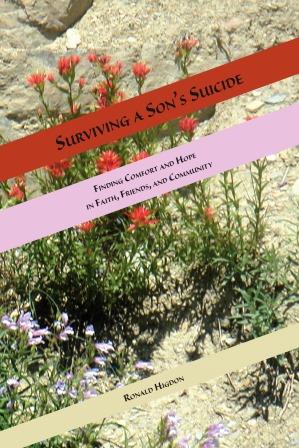
Kudos to Henry and Jody Neufeld for their courage to publish some pretty cutting edge books.
3:12 PM In a day of Christian political correctness (yes, we Christians have our own version of political correctness), these words ring true:
My joys and hopes do not rest in the US of A, but rather in God's eternal, glorious kingdom which will never pass away or be overcome by the darkness. Fret not dear brother or sister, the King is remains on the throne!!
Thank you, Joel, for the reminder.
2:14 PM Photo update:
1) Last night's moon. Eerie or what?
2) My daughters all agree that my living room looks much too bare. Not to worry, though. One of them is helping me pick out new furniture tomorrow down in Durham. Can't wait to see what she chooses.
3) Having a dinner party Sunday evening for several friends. Just bought the steaks. New York Strips. Mmmm.
2:04 PM A beardless Jesus? Tell me it ain't so! All real men have beards.
1:50 PM The latest review at Amazon for my Why Four Gospels?:
This book was so well written and easy to understand that I read it in one sitting and learned more then I had about the New Testament in ages. I highly recommend this book for everyone, and essential read for young New Testament scholars.
Appreciate it!
11:44 AM I see Henry Neufeld has his own custom Bible. Yes, he's being facetious.
Should we try to make our Bibles less custom? I think it’s a good idea to do so, but only so long as we remember that we won’t get there completely. When we forget the things that influence our own interpretation we tend to get arrogant.
One of the ways I think we customize the Bible today is when we resort to euphemisms for language that might seem to be a bit harsh to the modern ear. You may recall when the Federal government gassed 17,000,000 chickens in Pennsylvania in the 1980s because they were spreading a virus. Of course, when they announced what they had done, they said they had "depopulated" the birds. Right. In Philippians, Paul's uses a pretty direct term for what he now considered all of his former assets. The term he uses is usually rendered "garbage" or "manure" but it's a little more direct than that. Perhaps the best we can do is "unspeakable filth." Whatever name you use for it, it's pretty smelly stuff.
I'm not saying we should never use euphemistic language. But it's probably a good idea to try and understand what underlies such usage. "Collateral damage" means that our military killed innocent civilians. To me that makes as much sense as calling a guillotine a remedy for migraines.
Beware euphemisms!
11:28 AM Update: I'd like to add more one point to our discussion of Andrew Wilson's defense of the authenticity of eike in Matt. 5:22a. He argues that the word was accidentally omitted. I would argue the opposite. Again, it's my view that the word was intentionally omitted in order to harden Jesus' otherwise nuanced teaching about anger. But my main point here is this: Where more than one plausible explanation of the internal evidence is possible, it is helpful for students to be exposed to all of them. This, in fact, is the main problem I find, for example, with my friend Don Carson's defense of the shorter reading both in his commentary on Matthew and in his book on the Sermon on the Mount. He argues that the word was added to soften Jesus' teaching but utterly fails to tell us that it is also possible, purely on the grounds of the internal evidence, that the word may have been omitted for the exact opposite reason.
Your thoughts? Chime in on your blog.
11:20 AM Next year I will be honored to give the Distinguished Christian Scholar Lectures at Mid-America Baptist Seminary in Tennessee.

The dates are April 14-15. The schedule is:
-
Tuesday: Chapel 11:00, Ph.D. forum in the afternoon.
-
Wednesday: Chapel 11:00.
Looking forward to it!
10:54 AM Had a nice interview this morning with the SEBTS PR department. It should be posted next week. The series is called "Faculty Q & A." For previous interviews, go here.
10:39 AM Good morning! We're working on the web server so please be patient with me.
Tuesday, October 7
5:58 PM So, have you had your daily dose of Greek yet today?
5:16 PM Here's a heart-wrenching story about a 29-year old newly wed suffering from terminal cancer. No, I do not recommend the choice she has made. But I do understand her dilemma. It's one that many if not most cancer patients face: go through treatments with the hope of prolonging your life, or forego the treatments in order to have a better quality of life until you die. Talk about a moment of truth. I am reminded again just how weak I am and how much I need a God whom I can trust implicitly with the hard questions of life. There's no tremendously deep or theological point I want to make here, other than thanking God for His grace and mercy that follows us all the days of our lives, even to the very last day. May this be a fresh incentive to serve Him wholeheartedly and to join Him in the great task of equipping the church and taking the Gospel to the ends of the earth!
5:06 PM "If a care is too small to be turned into a prayer, it is too small to be made into a burden." Corrie ten Boom.
2:16 PM A few of us are going to see this flick on Thursday.
Have you seen it yet? Your thoughts?
2:08 PM Do you agree with this?
The great and good Charles Malik echoed these remarks in an address at Wheaton College, noting that he craved to see “an institution that will produce as many Nobel Prize winners as saints.” For a follower of Jesus, then, scholarship is nothing but acknowledging the two-way causal connection between thinking and doing. I, for one, am very thankful for evangelical scholars who have modeled for me responsible intellectual existence. Oh goodness, how we need scholarship in the evangelical church today. Ideas have consequences, and the truly integrated life will always eschew intellectual apathy.
10:20 AM Been emailing with a good friend this morning. I asked him how I could pray for him today. His one word response? "Wisdom." Ditto on that! He asked me how he could pray for me. I told him, "I'm trying to write. You know how that is." Would you like to know what I'm writing these days or what I anticipate writing in the months and years to come?
1) Any day now I will get the final proofs for my Greek grammar in Spanish. It will need going over with a fine-toothed comb.
2) I have a Festschrift essay due Nov. 1.
3) I am still plugging away at Godworld: Enter at Your Own Risk, my book on kingdom living.
4) I am writing my story as Becky's caregiver.
5) I am trying to get Harry Sturz' book back into print (I will write the foreword).
6) I am hoping to produce my own translation of the New Testament based on the nuances in the Greek text.
7) There's something else, but I forgot what it was.
I liken writing to walking. You just keep at it. But thankfully, on occasion I feel like I'm walking in an airport and then I step on one of those moving sidewalks. You're still walking but you're going a lot faster and it seems a lot easier. You zip right past all the slower-moving pedestrians. Then, alas, you step off the moving sidewalk and you're on your own again.
Today things are moving pretty well, thank the Lord. But it's OK if things slow down. I'll just keep on walking. Perseverance is as essential to writers as it is to athletes. A good writer will also take an editor's words to heart and allow others to improve his or her work. In short, writing is a long, satisfying road. But it sure takes work!
9:32 AM A former student of mine is teaching Greek in his local church. One of his students just emailed me to say:
At the age of 67, and with 10 grandchildren, I am taking the class.
If that don't light your fire, your wood is all wet.
9:25 AM Well, have you visited Andrew Wilson's website yet? I've been mulling over his examples of textual variants, especially his treatment of Matt. 5:22a. The question here is, "Did Jesus forbid all anger, or only causeless anger?" Here are Andrew's arguments in favor of including the Greek adverb eike, normally translated "without cause," along with my comments.
1) In Matthew 5:22, Jesus said, 'whoever is angry with his brother without a cause shall be in danger of the judgement'. A small number of Greek manuscripts omit the words 'without a cause' (P64, 01, B, plus two other late manuscripts). P64 is the oldest manuscript at this place, but these three manuscripts are all Alexandrian - that is, they are textually related to each other, so it is not surprising that they have the same reading. The vast majority of manuscripts contain the words. When we look at the versional evidence, not only do the Old Latin and the Syriac versions contain the words, but even the Coptic versions contain them too, breaking ranks with the three Alexandrians, their stablemates.
I agree with Andrew here. The inclusion of eike is supported by the majority of both manuscripts and text types. Thus, on the basis of the axiom "Prefer the most geographically widespread reading," eike wins hands down. Good job, Andrew!
2) In terms of transcriptional probability, the omission is only one word in Greek, and the fact that scribes tended to omit single words rather than add them means that the omission is far more likely to be the result of scribal oversight, especially when there is a case of homoeoarcton involved, like here, where the following word starts with the same letter as the word in dispute.
In my opinion, Andrew's argument is good as far as it goes, but it doesn't go far enough. The question here is the basic question of internal evidence: "Prefer the reading that best explains the origin of the others." Andrew posits the theory that a scribe may have omitted the disputed word because, in general, scribes were prone to omit single words in their copies. Point well taken. But there is another possibility here. What if Jesus' teaching on anger were understood by some scribes as being too "soft," that is, what if His teaching made Him look too indulgent toward anger? I can easily see someone in the ancient world arguing, "Of course we are to have a good reason whenever we get angry, but the fact is that I always have a good reason when I'm angry." In fact, in this scenario, Jesus' teaching would actually be a dangerous one for immature Christians who could not live in the gray areas, whose tendency perhaps was to rationalize their sinful anger away on the basis of that little adverb eike. So, in a church that might have gone too "soft" on anger, the easiest way to resolve the problem would have been to simply excise the offending adverb from the ext and -- voila! -- problem solved. Now Jesus is forbidding all anger!
My friends who argue that eike was added later in order to soften Jesus' harsh teaching about anger have a point. That's certainly one possibility. But the opposite may also have occurred, and the word may have been omitted for the opposite reason. By the way, this is one reason I view the internal evidence as corroborative rather than probative. If one is left with only the internal evidence, one usually finds that either reading makes good sense in its context.
3) In terms of theology, the Bible makes a clear distinction on the subject of anger: it is sometimes right and proper for us to be angry, while anger can also sometimes be sinful. Thus, Jesus was angry (Mark 3:5), God is angry with the wicked every day (Psalm 7:11), and the Christian is told to 'be angry and sin not' (Eph. 4:26). The words 'without cause' in Matthew 5:22 seem to nicely capture the right balance and the retention thus seems more in keeping with what the Bible elsewhere teaches.
All well and good. Andrew might have also pointed us to James 1:19-20, where we are informed that we are to be quick to listen, slow to speak, and slow to get angry, for human anger does not (generally speaking) accomplish God's righteousness. He might also have delved a bit into the subject of anthropology: since we are created in God's image and likeness, and since God Himself gets angry, perhaps human anger is a legitimate emotion after all.
4) Thus, although antiquity favours the omission, on the other hand majority, propinquity, theology and transcriptional probability strongly favour the retention of the words. It is hard to see how the words, if they were originally missing, could have spread to so many different geographical regions in exactly the same form if they had been added in by inventive scribes taking liberties with the text. It is more likely that one extremely limited stream of related evidence accidentally omitted the word.
This is well said. The only quibble I have is with this statement: "antiquity favours the omission." I simply don't believe this is true. Both readings are equally early. We know this from (among other things) the versional attestation. The fact that "without cause" is known in the Old Latin, for example, pushes the date of that reading into the late first or early second century. Hence the argument from antiquity, as with the argument from the internal evidence, cuts both ways. In the end, either reading may claim to be "old."
One last observation and then I'm done (blog posts are supposed to be short!):
One of the major characteristics of Matthew's Jesus' Sermon on the Mount is the predilection to nuance Jesus' words. Two examples will, I hope, suffice to make my case. First, in Matt. 5:11, Jesus makes it clear that His followers are blessed when they are accused of evil "falsely." That little word "falsely" (in Greek pseudomenoi) is omitted in the Western text type. Yet it is exactly the kind of nuanced exception one might expect from Jesus. Our second example comes from the famous passage on divorce in Matthew's record of Jesus' Sermon on the Mount (Matt. 5:31), in which Jesus asserts, "Everyone who divorces his wife (except for the matter of sexual infidelity) causes her to commit adultery, and whoever marries the divorced woman commits adultery." The words in parentheses are clearly an exception to Jesus' normal teaching about divorce and remarriage -- an exception found neither in Mark nor Luke. Thus it is not very surprising to me that Jesus would have clarified to us what He meant when He said, "If you get angry, you must have a very good reason for doing so. Otherwise you will be liable to judgment."
The bottom line? Andrew argues for the originality of eike in Matt. 5:22. I couldn't agree more. I can't possibly over-emphasize the importance of New Testament textual criticism for both doctrine and practice. My heartfelt thanks to Andrew for all the work he has put into his website. I hope it gets the reading it (in my opinion) certainly deserves.
P.S. In September of 2012 I had the joy and privilege of examining "up-close-and-personal" an original Erasmus 1516 Greek-Latin New Testament, compliments of the library at Criswell College in Dallas.
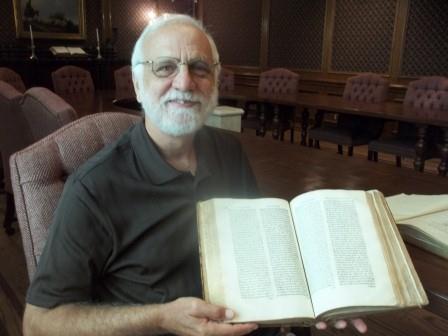
Below you can see the disputed word eike (third line, second word from the right).
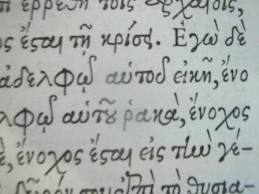
Monday, October 6
8:54 PM I know. I know. I am incurably nostalgic. Well, I knew tomorrow was going to be rainy, and I also knew that today's weather would be nearly perfect, so off I went on a day outing to Lexington, VA. I don't know why, but lately I've been feeling a need to retrace the steps of some of the trips Becky and I made together, and one of our favorite haunts was this quaint town in the Shenandoah. Just knowing that Bec and I spent so many happy moments together there helps me to cope with the loneliness of her loss. The sharp pain has gradually lessened, so much so that I can make trips like this one and be filled with joyful memories. When you lose a spouse it is hard to know what is "normal," but somehow revisiting the past helps to calm down the emotional roller coaster. At any rate, I'm too tired to blog anything of substance tonight so I'll just leave you with a few pix -- and mighty bored you'll be if you view them!
1) The famous Natural Bridge in Rockbridge County. What a delightful hike there and back.
2) Yep, "G. W." was there.
3) The beautiful campus of Washington and Lee University in historic Lexington. When Robert E. Lee became the college's president there in 1865, he said that he had finally found his calling in life. Ruing his military career, he became one of the most innovative educators in American history and introduced both an elective system and an honor system that are still in use today.
4) Stonewall Jackson taught at next-door VMI. He is buried in the city's cemetery.
5) This chapel was the first building that Lee, as president of Washington College, erected.
6) Its simple interior is impressive.
7) Lee's pew. The man led by example, refusing to make chapel attendance required. "You don't force people to worship God," he said.
8) Edward Valentine's famous "Recumbent Statue" of Lee asleep on the battlefield.
9) Even Traveller is buried at the chapel (though just outside the back door). I too once had a horse named Traveller, though it seems like centuries ago now.
10) Here's the home the college built for President Lee and his family (with a livery for Traveller attached).
11) The Episcopal Church attended by Lee and his family.
12) The Stonewall Jackson House. Our one-hour tour was magnificent. My hat's off to the volunteers who did such a fantastic job.
Who knows where my nostalgia will take me next. Stay tuned!
9:06 AM Good morning, thoughtful bloggers and lovers of God wherever you live!
As you know, I am an amateur textual critic of the New Testament. Yes, I realize I've written the definitive volume on the subject, all 80 ages of it (*wink wink*). But at least I was honest about it in the subtitle: New Testament Textual Criticism: A Concise Guide.
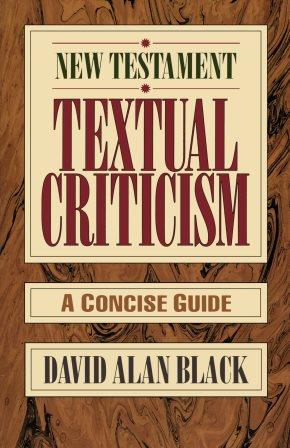
I personally enjoy dialoguing with New Testament scholars who are experts in this field. I have wonderful friends in the academic community who have published essays and books on the subject. At the same time, I have never been very happy with their scholarly conclusions, viz., that the Byzantine text type is secondary and therefore inferior to the Alexandrian text. I guess you could call me a Sturzian in this regard. Harry Sturz was a top-notch textual scholar of a previous generation. (Go here for a tribute.) His doctoral dissertation focused on Westcott-Hort's theory that the Byzantine text was edited in the fourth century and was, in essence, a conflation of the two other major text types, the Western and the Alexandrian. Today one finds a predilection for the views of W-H among scholars, whether conservative or non-conservative.
So where do I disagree?
Well, read Sturz's The Byzantine Text-Type and New Testament Textual Criticism for the answer. Sturz did a wonderful job (in my opinion) of completely de-bunking the W-H theory. My conviction is that the Byzantine text type is not edited in the W-H sense and therefore of equal importance to the other two major text types. Hence the external evidence is probative, and wherever it shows that a reading is more geographical widespread than its competitor reading(s), I tend to prefer that reading. Now, I've not been silent about my views. I've put my thoughts in writing and published them in such journals as New Testament Studies, Novum Testamentum, and Filologia Neotestamentaria. (Go to this page and scroll down to the bottom to read these essays on Google docs.) Think about this: If the current scholarly consensus is wrong about the Byzantine text, this would entail completely rethinking our approach to resolving textual variants. First, it would mean resurrecting the Byzantine text from the theological trash heap to which it has (for all intents and purposes) been relegated. Second, it would mean giving a more important place to the geographical distribution of text types than heretofore. And third, the internal evidence would assume its proper role, which in my view is corroborative rather than probative. The undeniable reality is that my views are in a strict minority among New Testament scholars. The subject is very complex and to some degree ambiguous, to the point where good scholars can and do disagree. To my knowledge, I am the only living Sturzian who has published his views on the subject.
At least I was.
This is where my emails come into play. This morning I received a message from a scholar of textual criticism who lives in Australia. His name is Andrew Wilson and he is a fellow-Sturzian. He calls his view "Balanced Eclecticism" (instead of my "Reasoned Conservatism"). And it is indeed a balanced approach. Care to see a few examples? Go here. We who believe that the New Testament text is authoritative should and certainly can participate in the debate. I encourage you to check out his website and ponder the examples he gives. You will see that he fits squarely into a round hole. As an incurable infracaninophile, I like that (as you know). But most of all, the subject is fascinating and, dare I say it, enjoyable! So whether or not you end up a Sturzian, have compassion of the one or two Sturzians who are still around and prayerful ponder if what they say has any legitimacy.
And start reading Sturz's book!
Sunday, October 5
8:50 PM Photo update:
1) My supper tonight consisted partly of this tasty sirloin steak. The entire meal cost me under $5.00.
2) Afterwards I bundled up, and the dogs and I enjoyed some ice cream sandwiches on the front porch. (They are such polite beggars.)
It's hard to believe that tonight's low will be 44 degrees. Time to get out my winter clothes. As for the rest of the evening, I'm going to sit back, relax, and watch The Great Escape.
8:02 PM Grateful for this email:
I pray your ear is doing much better.
I replied:
Thanks so much for praying about my ear. Please don't stop now. It still hurts and is plugged. There is not a thing I can do about it. We'll see what the ENT specialist says later this month. As Becky would say, "God knows...."
7:50 PM Becky had an unusual maiden name. She was the first "Lapsley" I had ever met. But then again, Becky was an unusual woman. Until Sept. 11, 1976, when she became Becky Black, she was Becky Lapsley, the name assigned to her by her parents. She learned to sign that name on her kindergarten scribbles, then on her high school term papers. More than any other label, those two words defined who she was. Her father, Brad Lapsley, the only son of Mr. and Mrs. J. B. Lapsley, made sure his children knew and appreciated their family tree.
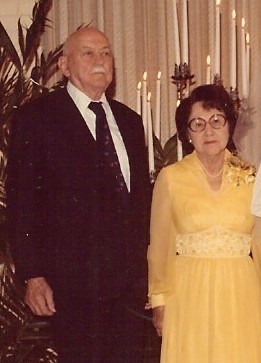
In time I got to know her grandparents (known to their family as Big Father and Grand Mommee). On trips to Dallas before our marriage I would visit them in their upscale Dallas home. Big Father never looked the camera in the eye. He had been a Colonel in the U.S. Army and then a first vice-president of one of Dallas's larger banks. Grand Mommee lived to be over 100. She and Becky were very close. Looking back now, I see how very special these times were in Becky's life. She loved her family, appreciated her "roots." Her relatives became important to me not for what they were but for who they were -- Becky's kith and kin. Eventually her grandparents' house was sold, and today it stands as a heap of rubble until the new owners rebuild it from the ground up.

When you realize that it was "just yesterday" that you were watching a Dallas Cowboys football game in that living room, you begin to feel the passing of time. In three weeks, Becky's mom and dad will visit me from Texas to share in the one year anniversary of Becky's passing. Becky -- a product of her family, of her genealogical roots? Yes, I suppose. But her parents had raised her to have both roots and wings. She flew -- dare I say soared? -- in directions no one, not even her own family members, could have predicted. That I was along for the journey still amazes me.
When I get to glory I hope the line won't be very long to see Big Father and Grand Mommee. If it is, I might have to elbow my way to the front just to thank them for what they meant in their granddaughter's life. (Not really: I'll wait my turn.) Right now, it's enough to ponder the fleeting nature of time. Everything precious in this world moves rapidly toward its end, which is partly why it is so precious and beautiful.
3:24 PM Today NPR's Radio Lab program aired a fascinating story about our universe. In passing, they mentioned the Copernican Revolution. Remember that? It was when earth went into orbit. Up until the 16th century, everyone knew that the earth was the center of the solar system. The sun rose and set, the moon rose and set, the planets and the stars rose and set around the earth. Then Copernicus came along. Suddenly the sun was at the center, and the planets (including the earth) were propelled into orbit.

My brain immediately went to New Testament ecclesiology. Because, in the end, isn't church leadership simply a matter of placing Jesus Christ at the center of our universe? New Testament writers were zealous to guard the truth of the preeminence (the "first-placeness") of Jesus Christ against all would-be intruders, church leaders included. And yet we have spawned structures that place mere men above Christ. My thesis is simple: church structures will be legitimate or illegitimate to the degree that they allow Jesus Christ to have the first place in everything. That is, our ecclesiology must first and foremost comport with New Testament Christology if we are to get this thing right. Which is one reason I like the concept of mutual elders so much. When you have no senior pastor except for Christ, no longer will you be able to separate the church into classes of Christians -- those who are "clergy" and those who "laity." Each Christian will be seen as a fulltime minister. And the leaders that do exist will gladly recede into the background by letting Jesus be preeminent in all things, including vision-setting. Whatever else the New Testament teaches about the church, surely the preeminence of Jesus Christ must be at the core. But for this to take place, church leaders are going to have to propel themselves into orbit. Yes, I know this is not the world's CEO model. But, as Jacque Ellul reminds us, "Christians should be troublemakers, creators of uncertainty, agents of a dimension incompatible with society." After all, we follow one to whom all authority in heaven and on earth has been given, the one who created the universe and who upholds it by His powerful word (Heb. 1:3). Not too sure He really likes sharing the glory with anyone!
2:58 PM Had the joy of taking Kim, Joel, and the grandkids to Mexican food today after church. Today is Caleb's 3rd birthday so he got to wear the sombrero. We all left bedecked with happiness!
9:50 AM Just back from a walk on a perfect fall day.
Farm life is the life for me. I love the outdoors. I love the quiet and tranquility. A farm means open roads, thick woods, quiet streams, clean air, happy dogs, and a relaxed atmosphere. It also means hard work, inconvenience, interruptions, spiders, snakes, dear eating your crops, molting animals, and things constantly breaking down. I suppose you have to be a little eccentric to live on a small farm.
Think I fit the bill? :-)
8:46 AM I snapped this photo yesterday at the Natural History Museum in DC. Roosevelt obviously labored long and hard over this draft of his address to Congress on Dec. 7, 1941, "a date which will live in world history" -- oops, "...in infamy."
Revising a paper teaches us to be better writers. I even revise blog posts before typing them, especially when something I say might admit of more than one interpretation. But it is equally important that we begin by writing something. I do so in longhand, realizing that I will be revising everything I say.
How do you write?
Saturday, October 4
9:56 PM Hi folks,
Greetings from Rosewood Farm! Just back from a quick trip to the Manassas Battlefield Park in northern Virginia and thence to DC to visit with one of my daughters. I must confess: I am a Civil War bore. I quite agree with Gertrude Stein, who said, "There will never be anything more interesting in America than the Civil War." The war was my hobby for 25 years as a reeenactor, even though I hardly know where my uniform and accouterments are today.
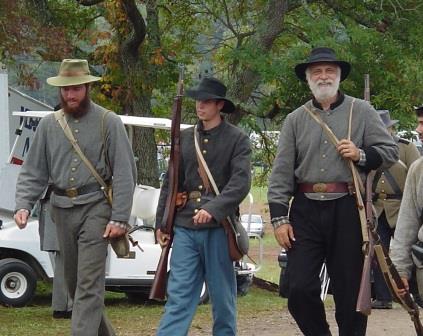
On my visit to Manassas yesterday I stood and stared at the Henry House with awe. I've been in many different countries and seen many historic sights, but few things are more fascinating to me than a pristine Civil War battlefield sans all the gaudy monuments. As for reenacting, yes, I've had my share of "period rushes" during battle reenactments. I even participated in the big First Manassas event when there were upwards of 25,000 reeenactors present. Fields and cows and crooked fences and old houses -- does life get any better? You wake up in the morning, stumble out of your tent, sniff the coffee brewing over an open fire, and you're experiencing the ultimate time-travel high. Reenacting is a great family hobby, but it's also a huge mission field. With evangelical fervor I would preach the Sunday morning period worship services (though my messages were anything but make-believe), then I'd lope off to fall in with my company for battle ("On the right by files into line -- march!") and discharge my Enfield rifle until I ran out of ammo or was told by the sergeant to "die" -- a command I dutifully obeyed, though usually only when I had found a good shade tree to lie under. I'd spend weekends grubbing around in the woods in a sweat-soaked wool uniform. No ties did I have to the war: my maternal grandparents had emigrated from Romania to America through Ellis Island, while my paternal great-great grandparents (the Millers) were all pacifists who sat out the war while tending their farms along the Antietam Creek in western Maryland. Civil War reenacting, as some have put it, is more addictive than drugs and almost as expensive. You're talking at least $2,000 to get fully outfitted as a private (my "noble" rank), including your tentage and reproduction musket. This is escapism elevated to a fine art. Becky's cooking was always exceptional -- and period to boot.
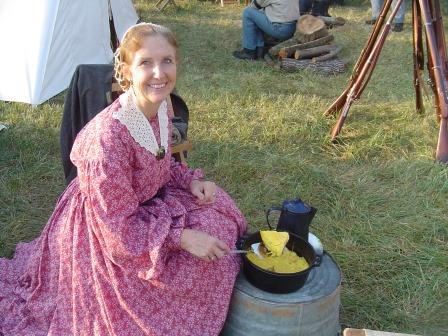
But back to the Manassas Battlefield. The park itself is a national treasure. (At this point I'm reminded of the dimwit who wondered why so many Civil War battles were fought on national parks). Traipse around the grounds and its like the music from the Twilight Zone. The park's movie theater is playing a new film that is definitely worth seeing. The Battle of First Manassas (aka Bull Run) proved that the South could fight and that the North could blunder. A mere 620,000 deaths later and the war would come to an end. The downside of reenacting for me is that it can breed a certain kind of war-glorification. Jefferson Davis, for one, might have been startled by modern-day reeenactors. "The past is dead; let it bury its dead, its hopes and its aspirations; before you lies the future. Let me beseech you to lay aside all rancor, all bitter sectional feelings, and to take your places in the ranks of those who will bring about a consummation devoutly to be wished -- a reunited country." Davis spoke those words to a group of young Southerners shortly before his death. His words aptly summarize the ambivalence I feel toward reenacting today. Playing bang-bang on the weekend is hardly an authentic experience of battle. That would take rancid bacon -- not to mention live ammunition and Civil War diseases. (The biggest killer during the war was not the bullet but the microbe.) I've seen plenty of reeenactors get killed, only to roll over on their side and light a posthumous Marlboro. What's even funnier is the occasional redundancy when two Robert E. Lees show up at the same event. (I kid you not.) No longer a Civil war acolyte, I laugh out loud thinking about that oddity -- and the thousands of reeenactors who desperately need liposuction (most American men during the war weighed no more than 135 pounds.) I'm OK with reenactment parking areas being designated "Federal" and "Confederate," but that's as far as it goes for me these days. As Jeff Davis might have put it, "Get over it and move on."
Still, something awesome leaps up from the ground and strikes you unexpectedly at places like Manassas. Even the word "Manassas" -- unlike the more Germanic "Gettysburg" and "Fredericksburg" --sounds hauntingly beautiful. This weekend it was strange being on the actual spot where the 85-year old widow Judith Henry perished (she refused to be removed from her house during the battle). She became the first civilian casualty of the war when her house was hit by an artillery shell. She is buried out front in a simple enclosure.
And this is the site where Confederate General Barnard Bee (whose words "There stands Jackson like a stone wall" are known to every child in America) was mortally wounded.
It was down this hill that the Federals fled in panicked retreat, causing some to dub the battle "The Bull Run Races."
Before we leave the battlefield, here's Thomas Jonathan Jackson, who was to be mortally wounded by his own men at Chancellorsville. It was here at First Manassas that he earned the nickname "Stonewall."
On to beautiful DC we went.
We stopped by the Air and Space Museum to take in the new IMAX film "D-Day" and then to grab some pix of the WW II aircraft on display, including this ME 109.
Since it's October, we decided to have lunch at a local German cafe, where I got to chat with one of the German servers about die Heimat. (Yes, I miss it too.)
Last night I stayed, incidentally, at a wonderful B & B near old town Manassas, the Bennett House -- as cozy a home as I have ever visited.
Next door I spotted this beauty for sale for a mere $760,000. Any takers?
I'm grateful beyond words for God's blessings, including the joy of traveling and going to new places. The Smithsonian Institution alone would take weeks and weeks to exhaust. So, I encourage you to get out and explore this great country of ours. You won't just be reading history, you'll be living it.
Dave
Friday, October 3
8:54 AM Are you a cessasionist or a continuationist? I want to go on record and affirm that I am a passionate continuationist.
1) I believe we ought to continue the pattern of simple, radical, life-style evangelism begun in the book of Acts. After all, it worked for the early church.
2) I believe we ought to continue bearing a humble, faithful, and consistent testimony to Christ, as the early believers did. Yes, the early church knew of signs and wonders, but the greatest work of the church has not been the spectacular but rather the faithful day-in and day-out living of normal everyday Christians.
3) I believe we ought to get out of our cozy churches and put Christ on display in the world's darkness where we are needed. For the early Christians, the field was the world, and the corn of wheat had to die if it was to please God and bear fruit. Why, then, do we sit around debating theological puzzles when we ought to plant our lives in the ugly soil of the world?
4) I believe we ought to continue the emphasis of the New Testament upon every-member ministry, since we are all priests – every one of us – of the Most High God. No church in the New Testament had a single pastor who did all the work. If you have such a leader in your church, fire him – and then hire him back immediately as your CEO, "Chief Equipping Officer" (Eph. 4:11-12).
5) I believe we ought to continue the early church's rejection of blind patriotism. The only Christian nation the Bible knows is the blood-bought, born-again purchased people of God.
6) I believe we ought to follow the example of the apostle Paul and eschew the excellence of human oratory and any appeal to human wisdom. Nothing about the Gospel pleases this world, and we are never so foolish as when we try to dress it up in the garish garments of this age.
7) I believe we ought to continue the example of the early church and reject position and power as the measuring sticks of success. Why should we seek prominent seats in the kingdom when our Lord promised us not seats but suffering? Obedience cost John the Baptist his head and Jonathan Edwards his pulpit. What has it cost us?
So ... are you a cessasionist or a continuationist?
Thursday, October 2
5:52 PM Just cooked a steak, mashed potatoes, and corn for this day of commemoration. Delicious! What happy memories of dining with Becky!
12:48 PM Have you ever heard of John Glas? He lived from 1695 to 1773 and was an ordained minister in the Church of Scotland. That is, until he was stripped of his ordination in 1727. His misdeeds?
-
He called for a plurality of local church elders instead of leadership by a single pastor.
-
He taught that the Lord's Supper should be observed weekly instead of monthly or quarterly.
-
He said that ministers should be chosen on the basis of their character and Bible knowledge rather than because of a degree from a theological institution.
In short, John Glas was defrocked because he attempted to establish a church along the lines of the New Testament. He also called for other Christians to join him in the restoration of primitive Christianity. Later on, in the nineteenth century, the weekly observance of the breaking of bread and the ministry of all believers became the foundation stones for the Brethren movement.
So, what do you think of John Glas? Is the modern church in America ripe for new religious formation? I have a hunch that it is, and that men like John Glas are tragic heroes from whom we have much to learn. Incidentally, in case you're interested in studying the history of restoration movements in the Western church, there are no better resources than Donald Durnbaugh's The Believers' Church and Donald Kraybill's The Upside-Down Kingdom.
Wait a minute – I wrote a book on this subject myself!
12:40 PM A report suggests that 90 percent of all medical research studies are wrong. That is an astounding figure. To put it frankly: I do not place my hope in medical experts, as much as I appreciate the work they are doing. I don't know about you, but I never want to get to a place in my life where I do not look for miracles. Naturalism has never appealed to me -- you know, the idea that "since the fathers fell asleep, all things continue as they were from the beginning" (2 Pet. 3:4). This same argument is advanced today by all who try to explain everything by natural law and who refuse to believe that God can break through the usual course of nature. In their thinking, there is no room for God.
Does that even begin to make sense?
12:18 PM Did you know that Spain is the least evangelized Spanish-speaking country? Pray for the Gospel to bear fruit in that great nation.
9:45 AM Just picked these from Becky's rose garden. Ain't they lovely? They're in memory of the gardener, of course.
Today marks the 11th monthaversary of her death. For me it is an inexpugnable reminder of the incredible grace of God that we experienced during our cancer journey together. It's also a chance to reevaluate my life and ask Where do I go from here? Life has mellowed for me now that I've reached Geezerdom. I've already experienced that stage in men's lives where they have to revaluate the ladder of success they've been climbing and even reappraise the ladder itself. I'm no longer in the grip of the American Dream. Its demands are less absolute and work in general is less stressful. Even though I continue to pursue excellence, I'm frankly more interested now in the process and much less concerned with recognition. Yeats' poem "The Circus Animals' Desertion" says it well:
Now that my ladder's gone, I must lie down where all ladders start, in the foul rag-and-bone shop of the heart.
I've had to climb down a million ladders in order to reach out my hand and grasp what is of eternal significance. When more time stretches behind than stretches before, you see a gap between what you may have wished to become and what you actually have become. I no longer think I have to be a great writer or the perfect classroom teacher and, as I said the other day, the mentor in me is coming out. I hope to show the younger generation that water holes are often mirages, and that to succeed in life is partially to fail. Seasons of life pass in their proper rhythm, and as long as we are alive no season of life marks the end of opportunities for growth or the burdens of further progress. I have long since given up the image of myself as a youthful hero saving the world. I'm just an aging man who has accepted himself as a person of considerable experience and achievement and who feels privileged to be able to do work I enjoy and become a teacher-mentor to the younger generation.
God's dialogue with Job comes to mind as I contemplate life without Becky. "Have you descended to the springs of the sea or walked in the unfathomable deep?" The answer is no, of course not, Lord. But You have. To God, at least, nothing is new or surprising, least of all the death of a spouse. As for me, I will try to regard whatever time and energy He grants me as His property and not mine.
To change the subject: I've made an appointment with an ENT specialist. From Googling the symptoms, I probably messed up my eardrum on descent. My guess is that the drum is stuck or else there is fluid in the middle ear. But really, I have no clue. I do know that whatever dark tunnel we may be called upon to travel through, God has been there first.
Wednesday, October 1
9:05 PM Well, it turns out that the week I had planned is going to be very different from the one God has in store for me. Yes, I have decided to cancel my trip. Because life isn't about what we want. It's about doing the right thing. Now, I'm not saying I'm very good at this. There are lots of wrong decisions I've made in my life. And no, I don't expect to feel totally at peace with myself about this decision. Let's be honest. As wonderful as life is, it can also be a bummer at times. But the truth is that God is at work even when we are clueless. He shows up even when we feel lost in the fog. I won't be coming. That wasn't easy to write. But when I look back at what I wrote, when I realize that I've got to deal with this ear problem before it gets worse, I realize that I made the right decision -- an incredible, awful, difficult, abrupt about-face, a 180 - but the right decision nonetheless.
There's something almost comforting about how you can find your balance even when you're riding a roller coaster. Of course, just the mere fact that I have the option of seeing an ear specialist is itself mind-boggling. He is caring for me. None of this is happening outside of His loving arms. For most of my life, when faced with decisions like this, I would tell myself, "Push yourself, Dave, and get the job done even if it wipes you out physically." I've now decided that voice is a lie. It doesn't matter how much you enjoy serving Jesus or how much others need your service, it's okay to get tired and sick or to have an ear infection. Sometimes when I read blogs, there's a very real sense that life is nothing but a series of victories and happy moments, and indeed at times life is like that. But we need to get real. It's not okay to pretend. Yes, I want to know about your joys, but I also want to hear about those times when you feel you can't go on or when you are empty and confused or when your view of life is obscured by tear-clouded eyes or when you want to bury your head in your knees and cry your heart out. Think of John (whose head was cut off) or James (killed in prison) or Job (yes, that Job) or Paul (who could heal others but not himself). Is the implication there that life isn't always a bowl of cherries?
Maybe this sounds a little melodramatic, but I hate having to make decisions like the one I had to make today. It is so humbling. I seem completely unable to wrap my head around the fact that God once stripped Himself of everything and put on weakness and humiliation so that He might pour out His love on us without qualm or reservation. I never want to get numb thinking about how low He stooped to lift me up. Today I asked for a miracle, and though He didn't grant me the miracle I was asking for or take the pain away, I would be a fool not to recognize that a miracle has been given to me in the form of a Savior who is with me (as He promised) "day after day after day until the end of the age," regardless of my health or my ability to travel.
To those of you who emailed me with advice and prayers, my deepest thanks. We're all in this together, and not just us. He is eager to help us in ways we don't dare to imagine. So before finishing my emails and going upstairs, I thank you. I totally agree with the apostle Paul: I have no idea how people can live without Christ or apart from the community He established called the church.
6:07 PM Getting caught up on answering your text messages and emails. I was blessed by this text:
Please, please keep sharing from your heart as the Lord leads you. I go to your site when I need encouragement and refocusing. Spot on.
God is so good to me to give me encouraging friends like this one!
5:54 PM Evening, friends!
It was a busy day today. My Greek 1 class graded their exams and then I had to introduce what is probably the lengthiest chapter in my beginning grammar (chap. 7 on the imperfect and aorist tenses). In addition, my left ear has really been bothering me. I think to myself, You're such a wimp, Dave. The apostle Paul was shipwrecked 3 times and spent 24 hours in the open sea. He knew "exhaustion, pain, long vigils, hunger and thirst, doing without meals, cold, and even lack of clothing" (so he tells the Corinthians). I guess he never experienced the real hazards of travel -- no soap in the airplane's lavatory, or the flight attendants running out of blankets on an overnight flight.
Right now, at this very moment, I am having to decide whether or not to fly out tomorrow on my next international trip. I am packed. I am ready to go. I am eager to go. But my left ear is killing me. Do I risk a long-term chronic problem for the sake of short-term gains, or do I cancel out and have my ear checked by a specialist before boarding another airplane? If I do leave on this trip, this will involve 6 different flights in 10 days -- which means 6 ascents and 6 descents with the concomitant pressurization and depressurization involved. I have decided to make my decision by 9 pm tonight. I am willing to take risks for the sake of the Gospel. But I also want to be wise. How do I go about doing this? It will take more wisdom than I have.
Thank you. Thank you for letting me be honest with you. Thank you for sharing my journey with me. I wish Becky (a former ICU nurse) were here to offer advice. I so want to follow Christ. I so want to "carry each other's burdens and so live out the law of Christ." I know the conditions: "Let a man deny himself and take up his cross." But I can't do this by myself. He needs to enable me -- the One who Himself relinquished all His own rights and His own will as well.
I'll let you know what I decide. And I'd appreciate your prayers.
Peace,
Dave
8:18 AM You turn the computer on -- a simple push of a button that shows you a date stamp, a reminder that a new month has begun. It jolts you, this rush to the future, this flight from summer to fall and eventually winter. You laugh out loud. It was almost a year ago, you think to yourself. That can't be true. It happened just yesterday, didn't it?
Over the past few months, I've shared with you my raw experience of coming to grips with Becky's death. For four and a half years prior to that event, I watched the gradual weakening of her body and the long, slow loss of her ability to manage such basic needs as ambulation and toileting. I had become her caregiver, and it was a job I neither expected nor felt myself prepared for. My experience was hardly unique: Millions of people are unable to care for themselves. Becky's way of handling the crisis was simply to carry on with her life and ministries as planned. We experienced countless "new normals" as the disease progressed. But we both knew that the Long Goodbye had begun. Thankfully, we were never meant to travel this journey alone. Over and over again we experienced the support of countless people, including many of you. How much longer must I watch her suffer? I'd whine. A watch or timepiece is useless when it comes to determining how much longer until Jesus comes for you and takes you Home. But you're wasting your time if you are standing around checking your watch all day long. The Bible says "Keep busy until I come." Our lives should be ready for that day. Our hearts should be ready too.
When I go on a trip I often have to leave the house early in the morning to catch my flight. So when I go to bed at night I make sure everything is ready. I don't want to have to fumble around in a sleepy stupor packing my bags. I want to be ready. And so it is spiritually. I want to live today in anticipation of Christ's second coming. Yes, I'm still time-conscious, except now I realize that the best way of waiting is by keeping busy in the work of the Lord until He makes the final move. "We all find time to do what we really want to do," said William Feather. Goethe agreed: "Nothing is worth more than this day." Even in this age when we know the price of everything and the value of nothing, I can be about my Father's business.
When it comes right down to it, it really doesn't matter what season of the year it is or what my calendar says. I know the Home Coming party is near. Any day we'll hear the trumpet blow. Until then, I have still have lots of (hopefully) sanctified goals and dreams.
Jesus never told me or Becky when He would call either of us Home. He just urged us to live in anticipation of that Day at all times.
